#like its not as good in terms of quality but that sort of makes it easier to zone out to u know
Explore tagged Tumblr posts
Text
there's a certain quality the harmonies of like... early to mid 2000s alt rock has. which i am obsessed with... like i wanna do that. i NEED to figure out how to write harmonies that sound like that
#ari opinion hour#i sort of understand it but not necessarily well enough to do it on command#i think i sort of achieved the sound of it with my blaseball winter exchange song i did for snow but specifically only in the very last bit#like only with the 'im not alive anymore' part#(which sidenote i wish id had the second half faster + w more drive but its not like that was like a full recording which i could do)#i think i just need my music to have more teeth in general cause it scratches an itch that i think i must have developed due to some aspect#of music school. its probably my dissatisfaction with the attitudes in the classical world#<- which understand i say that in the same way that like my jazz prof does. the classical world doesnt have enough teeth nor enough#understanding of the way in which music is like. another art. and art needs to be able to have teeth and use elements normally regarded as#''undesirable'' on purpose because art is there to make you feel emotions and not just the positive ones and not just sadness or anger in#terms of the negative ones#art is there to make u feel ALL extant emotions and that includes boredom disgust fear jealousy pity cowardice apathy overwhelmedness etc#also the classical world i find often forgets what the word ''play'' means#i am of the opinion that perfection is a waste of time if i wanted perfect i'd ask a computer to do it for me. i want real#anyway. i forgot what this post was even about lol point is i need to figure out how to write harmonies that have that soaring quality that#like. you can hear it in like helena by mcr and wake me up by evanescence and stuff. and frankly most of the songs on three cheers for swee#revenge which i am listening to now for the first time. i need to learn more about this stuff maybe ill listen to the evanescence album tha#song is from next.#or something i should really be working on my essay but theres no way i wont have it done in time which is good i think i just mostly have#to worry about sources and stuff but even that should be relatively easy i think
5 notes
·
View notes
Text
Days with Somi: Expression
male reader x Jeon Somi
~13.9k words
A/N: I apologize if the plot (there's plot?) doesn't make sense because all the recent Somi pics got me dented in the head.
Thanks to @suchsweetstories for the beta read!
Enjoy.

Jeon Somi loves having sex.
Specifically, having sex with you.
You call it her ‘love language’. Her way to shower you with affection. Which you have to admit, for someone like Somi, checks off all of the boxes.
Receiving Gifts? Being able to fuck her on the daily is a gift itself. Especially when she offers up anal.
Physical Touch? You can spank her ass and grope her tits and she’d tell you to do it again. She even encourages you to do it as much as you want.
Quality Time? She’d fuck you anywhere if she gets in the mood. Your apartment, her apartment, the fast food restaurant’s bathroom, your car in a public parking lot. The post-sex cuddles you have with her are amazing too.
Words of Affirmation? Her screams of, quote: “Fuck, yes, more–” are enough to push you to go harder. She’s also expressing her appreciation of how good you’re pounding her pussy.
Acts of Service? Either she wakes you up with a blowjob or you wake her up by eating her out. It usually ends with one–sometimes both–of you being late to work. It’s one hell of an alarm clock though.
Sex has become a pivotal portion of your life ever since you started seeing her for a couple of months now. And it’s not like you’d ever say no to doing it with Somi. You made that mistake once, and while it was…an experience, you’d rather not have to call in sick because she fucked you too hard.
It’s the fact that sex is the only consistent way she shows her feelings for you that makes it feel a little bit superficial.
She comes over to your apartment angry at how the latest batch of makeup she made was shipped to the wrong address? She won’t ask you for comforting hugs, she’ll tell you to push her legs over her head and dick her down till she can’t walk.
You get frustrated over the new Return-To-Office policy your job announced because the office is an hour drive? She won’t say a word, just pull your pants down and squeeze your cock in between her tits.
You won’t lie, sex with Somi is Grade A, Top Tier, Perfection. You’ll never get tired of her body, her moans, her willingness to do anything. What you are tired of, is the absence of romance—for the lack of a better term—in your life.
Not in the physical way, no, she already gives you enough to last a lifetime. It’s that the emotional link that you feel was starting to degrade.
You want to be able to do the whole “Netflix and Chill” bit without it ending in the couch getting wet. To be embracing her as you wake up in the mornings. To spend the day doing nothing together.
And it wasn’t like she doesn’t say the words that you’ve been wanting to hear, because she does. She just says it with ‘your cock’ instead of ‘you’ a lot more than you’d like.
You’re starting to think that this is becoming more casual, something to scratch her itch, some sort of fuck buddy set up instead of as a couple. Maybe when this relationship with Somi was still at its infancy would you consider that type of deal–purely physical–because that’s what this was built on.
Thinking back, it’s how it’s always been. Even as she first approached you at the bar you two met. She ordered what you had—a shot of whiskey—and started off with small talk. You two got to know each other, and you may have had a few too many shots that made your lips a bit looser.
That’s why when you drunkenly tell her that she was hot in that white crop top she was wearing, and that you wanted to lick the alcohol off her stomach, all she does is smirk. The next words she said sobered you straight up.
“When and where?”
And that’s how you ended up playing body shots inside her apartment. It started off innocent enough. Well, as innocent as playing the sort of game that inevitably gets you both drunk and fucked.
You two kept in touch after that night. After a week or so of trading messages and a few racy pics from her, she invited you to meet up again.
This is when the cycle began. One of you invites the other to meet up for something, you do said something, and you two end up doing each other after. Then it happens again.
Somewhere along the way feelings were aired out and you two started to see each other more seriously. At the same time, railing Somi into any nearby surface became a 9-5 job.
Yet you can’t help but want more than that.
To be honest, you might be overthinking things. Maybe you should have sat her down, talked like two responsible adults, and figured out whatever’s happening between you two—really just you—before it got out of hand.
So you do the responsible move. Ask a friend for advice.
Although, you might have asked the wrong person.
“You’re overthinking things.” Aeri deadpans, taking a sip of her drink.
“I’m not overthinking it.” You deny. “I’m just…stressing about it.”
“That’s the same thing.”
“Look, are you gonna help out or not?” You scowl, crossing your arms.
“Fine. But you’re presenting to the boss next week.” She sighs, dramatically placing her drink down on the table. “Here’s what you do–”
The next hour becomes a weird lecture consisting of Aeri laying out an entire thesis of plans on how to woo Somi with your heart and not with your dick. You needed to note it all down just to make sure you didn’t miss anything.
After some planning and finalizing some dates, you settled on a beach trip. It was ordinary, casual, relaxing. A chance to have fun without too many shenanigans involved. You can even take her to the nearby festival that’s going to take place for some celebration too.
Of course, the trip being with Somi makes that a pipe dream.
Day one was mostly spent on actually getting to the venue, getting a feel for the area, and checking into the hotel.
And everything was going great. It was all going according to plan. After you take a break from all the driving you’ve done you told yourself that you’d take her out to see the tourist spots.
Said break is how you two end up at the hotel’s restaurant, enjoying the cuisine of different nations, the aroma of delicacies, the sound of the piano fluttering across the air. You had to veto room service because no breaks and no eating would happen otherwise.
“Oh my God.” The clattering of metal hitting ceramic fills the table. “I’m so full.” Somi’s slouched over the chair, hand over her stomach as you finish up your own plate.
“You did get two plates worth of dumplings.” You shrug, stabbing your fork down on a leaf. “And the crab too.”
“But it was so good.” She’s justifying, arms out across the table. “I kinda want more.”
“And make your ass explode all over the bathroom later?”
“Fuck you.” She laughs, throwing a napkin at your face. “Like you won’t be doing that later.”
“O–kay.” You exasperate, gesturing down. “Not in front of my salad.”
“Come on.” Her chin’s resting on a hand, tilting her head as she smirks. And it’s that smirk, that fucking smirk, that always precedes your downfall to the drug that is Somi.
Ruining her is usually an eventuality, especially given that you’re going to be alone with her for the next few days. But this time, you will not falter. You remind yourself why you’re here, what the point of this entire trip was about. That this is to show her how much you–
Oh Goddamnit.
Somi’s finger is on her tank top, stretching the fabric outwards. Her tits are practically squished together, making them a lot more bigger than they already are. Then she pulls down, and you find out that she wasn’t wearing a bra this entire time. You also find out that the only thing that was on her boobs were a pair of nipple tape covering her buds.
“You sure you don’t want to?” Her finger’s moving across her top, showing you more of that milky white skin, and she knows that you’re getting hooked. “I even brought lube.”
“Somi-” Your hand springs up, slapping her hand away and pulling her top back up in one smooth motion. “I thought we said no funny business outside the hotel.”
“We’re still in the hotel aren’t we?” Of course she’s gonna pull semantics at you. “Just a little quickie before we head out for the festival.”
The line’s set, and you’re tugging it. “You just can’t help yourself, can you.”
She’s lifting her arms above her head, emphasizing her chest, her tight clothing rising with it to show her stomach, defined and toned from all the yoga lessons she’s been doing. You unconsciously grip the table sheets.
“I just wanna show my appreciation for my sweet, sweet boyfriend-” She’s reeling you in, hard, and you inevitably let yourself be swept away. “-who set up this entire trip and drove me all the way here so early in the morning.”
You’re thinking of happy thoughts, the logistics of the rest of the trip that you have yet to do with her, the caesar salad that you’ve been enjoying. Anything to stop yourself from appreciating the view right in front of you because this is getting out of hand.
The chair screeches. “So whenever you’re done here,” Somi’s standing up, giving you a very nice view of her cleavage as she does. “I’ll be heading back up and getting myself ready.” That smirk is still on her face when she leans in. “Maybe if you’re fast enough you can have a piece of my ass.”
Your resolve is officially gone, the idea of having Somi’s sweet, tight ass once more becoming too tempting as she walks away, waving her keycard at you like it was some sort of prize. Your eyes are glued to her waist moving from side to side.
Sinker.
—
You had to sit and wave at the waiter to pay for the food. Normally you’d go right up to the cashier to do that but a particular brunette made it hard to stand up. Once you manage to get up from your seat without your hard-on in full display to the other patrons, you immediately speed walk it to the elevator.
You’re falling back into the same repetition of Somi causing trouble, dragging you to another round of debauchery. You already tried to set ground rules by only doing it inside the hotel, but you suppose you’ll need to re-negotiate it to just being in the hotel room.
Which, thinking on it, was where you were going. Sigh.
She’s irresistible, and she knows it. Shit, she flaunts it whenever she can around you because she knows you’ll give in eventually.
Maybe you can slip in one dose of Jeon Somi’s tight ass before you move on with your plan to take her out for a romantic date. Considering the plan’s already screwed up as it is, all cause Somi—and by extension, you—decided to have some fun.
Though, you really should stop this. Say no. Sounded simple enough. Just one word. Lay it out flat.
But the seed’s already planted. The picture of her in your hotel room, waiting, naked, touching herself, prepping for all the dirty things you’ll be doing to her; Your inhibitions get shot to pieces.
You already know what’s going to happen when you walk through that door. She’ll be somewhere in the room—the balcony, you bet—ready for you to ravish her. And for all intents and purposes, you might as well enjoy the detour.
Soon as you open the door to your hotel room, the TV’s blaring out music and the bathroom door’s open. You take your shoes off before walking up to the doorway to be greeted with the unholy sight of Somi.
Naked, leaned into the bathroom counter where she uses the mirror to glance at you, her ass swaying as one of her hands are in between her legs and the other resting on the cold marble right next to a clear little bottle.
“Hey there.” She sighs out. “Just–finishing up.” Her eyes are fluttering shut, two fingers pumping into her puckered hole, already knuckle deep at this point. Somi knows the drill when it comes to preparing herself for anal; she has it down to a science at this point.
Her hand slides over to the bottle, pushing it towards you as a silent suggestion before she ruffles her hair, making her all the more ruinable. You’re shaking your head, but you step behind her anyway, unbuckling your belt in the process.
“Always a tease.” You’re pulling your pants down, your boxers following after to let your cock feel the cold air of the bathroom.
“Like you don’t love it.” She replies, orbs blinking open, looking at you through the mirror with fuck me eyes as she pulls her hand away from her hole. “Ready when you are.”
You’re applying an ample amount of lube onto your cock, stroking to help cover your entire shaft as you move closer, resting yourself on her ass. “You’re excited.”
She rolls her eyes. “I’ve been horny ever since we got in the car.”
You scoff. “You’re always horny.”
She laughs. “Who wouldn’t when you have that cock–” Your tip’s pressing against her asshole, making her unable to reply as she feels you push into her. It’s splitting her open, her tight, slick ass taking you in slowly.
“Hurry up.” She’s taking deep, steady breaths as she presses back onto your cock, adjusting to the feeling of your cock inside her, taking even more of you as you grip her hips. As you bottom out, she lets out a groan, smiling through the pain of taking your entire dick up her ass.
“You’re getting impatient.” A hand lifts up from her hip to grab one of her breasts, squeezing the soft flesh. “Thought you’d wanna take your time.”
“You still gotta take me to that festival.” She moans out as you’re pulling out slowly, letting her get used to your size before you stretch her out again. She clenches around you, impossibly tight, as you slowly begin to buck into her. “And I wanna get to–Fuck, that’s it–get to the beach too.”
She loops one of her hands around her neck as a harness, pulling herself up to give you a kiss. “So as much as I want to enjoy this–“ Another sigh slips out of her, the pleasure slowly erasing any of the pain that she’s feeling. “–You need to dick me down, fast, so we can enjoy our vacation.”
You smile, dipping down to pepper kisses around her neck. “Something we agree on, babe.” Your thrusts progressively get faster into her, enjoying the feel of her ass, the lube doing wonders for the both of you as she braces herself once more on the counter.
She’s so unbelievably snug, the feel of her abs flexing on your hand as she sucks you in so much easier now, the wet, sticky, warm hole overtaking your mind as you get to pounding her asshole.
”Fucking missed this ass, didn’t you?” She’s watching you over the reflection, your gaze laser focused on the bounce of her ass. It was hypnotizing, seeing it recoil from how hard you’re ramming your cock into her.
“I never say no to your ass.” You grunt out, gripping her hip a bit firmer, squeezing her tit a bit harder, hammering a bit faster as you enjoy hearing her whimper your name out, her hand shooting up to hold onto yours as she shifts her body to lean into you instead.
”Then ruin my ass–“ She’s grinning, squeezing her breast over your hand. Her other hand is moving back down between her legs again, circling her clit, adding even more to the bliss she’s feeling. “–ruin it for anyone else.”
You oblige, hand crashing down on her ass before you grip her again, near the small of her back this time as you get rougher, thrusts getting more frantic as she starts to sing all these filthy words out.
“God, love you in my ass. Love it when you stretch my ass out, filling me, breaking me.” She’s on a tangent, muttering out all these porn star-y lines as if she is one, and honestly? She can probably make bank if all she had to do was take dick. “Gonna–Gonna make me your whore, aren’t you? Make me take your cock in all my tight fucking holes till I can’t fucking walk anymore–”
A sharp crack airs out, followed by a chuckle, slow, breathy, enticing. Her tongue’s out, tracing her lips. “Do it again. Slap my ass some more.”
And you do it. God do you do it. Your palm’s leaving hard slaps on her skin, leaving it with red marks that gets her even more fucked up as she watches, mouth widening at how much you’re utterly obsessed with her and her ass.
“Only think about cock nowadays don’t you, you stupid bitch.” You pinch a bud, giving her another slap on the ass. Whether she tightens up from the slap or the degrading nickname, you can only guess. “Guess it’s a good thing you’re getting mine.”
”Yes, love your cock–“ Somi’s rubbing herself faster now, fingers getting desperate as you slam harder into her hole, unrelenting. “Own this ass–” Her eyes are rolling back, her entire body starts to tremble, losing herself as she grips the counter again, letting herself be used like a doll.
”Oh, fuck–“ She lets out this scream, raw, husky as liquid starts to drip out of her, dripping down her legs all the way to the tiles. Her head slacks downward, eyes shutting, her ass somehow gets even more vice-like than you thought it could get, making you murmur out a curse, reluctantly pulling out of her ass to stop yourself from following her.
Her fingers are persistent, working her clit when you spread her ass, looking at her gaping hole. You grip your shaft, lowering it down to her pussy, slick from her cum, dragging it up and down, the feeling of her heat making you wet your lips.
She shudders when you push inside her cunt, legs still shaking as you bury deep inside her. Her ass may have been tighter, but the feeling of her pussy being so much more slicker and the way it was radiating heat makes you groan out.
“Miss my pussy too?” She purrs, using the mirror to look at the both of you. Her hair’s a mess, brown strands sticking out all over the place, tongue playfully peeking out as that damn smirk forms on her mouth while you start fucking her.
“Just getting a taste.” You’re wrapping your arms around her, locking eyes with Somi through the glass as you lean in to whisper in her ear. “Promise to cum inside your ass.”
She grins, leaning back, mouth dropping open as you start to pick up the pace, her body rocking forward every time you get balls deep inside of her. “You better. Want that cum filling up my ass, baby.”
You’re still focused on her face, from the way her eyes are rolling back again, from how rough you pummel into her, her mouth that’s panting out moans and begging for more of you, your cock, your cum. Her gaze never loses sight of you, watching you pound her into the marble.
Then you feel it. That all-familiar stirring in your balls, making you go feral, and she can sense it too, by how she pushes back against your hips, letting her take you for a ride.
You’re holding onto her tits, squeezing the soft flesh, rolling her nipples between your fingers, tugging at them, while Somi’s grounding herself by the counter as she’s bucking, grinding her ass against you whenever she takes you all in.
Her ass is fucking unbelievable to look at, soft, firm, bouncing with this rhythm that edges you closer to the end. The slaps of her backside hitting your pelvis is all you can hear, fueling you further to bursting. That tightness in your balls is building, the feel of her wet, hot pussy sending you to the deep end before you spill inside her.
“Gonna cum, Somi, fuck–” You lock up, going for one last push to cross the finish line as you send it, deep, filling her completely with your length.
The pressure breaks, hands sliding down to hold onto her curves, locking her in place as you cum, shooting up her pussy, the few hot spurts painting her walls. Then you remember where you’re supposed to cum, and pull out abruptly. Cum’s still leaking out as you press your tip into her asshole, flooding her pucker with your load.
“That’s it.” She stills, moaning in tune with every pulse of your cock, filling her ass, rolling her hips as you thrust, stuffing her with cock, giving her every bit of your cum. “So much hot, fucking cum all inside me.”
You slump over Somi, resting your head by her nape, completely spent and she’s glowing. As if your cum was some sort of energy drink that invigorates her, looking like she wasn’t pounded into the bathroom sink.
“So–” She plants this sloppy kiss on your cheek, a snicker coming out of her as she rests her head on yours. “My ass still as good as you remember?”
“Always.” You sigh out, pulling out of her and drawing her into your arms. “Now shut up and let me have this moment.”
Her lips curve upwards, air scoffing out through her nose as she leans into you, running a hand through your hair, damp from your past actions. She leaves another kiss on your shoulder, soft, loving.
“This is nice,” she mutters out, nestling underneath you.
You hum in agreement, seeing yourself smiling over the reflection of the mirror.
Even if you two have done this so many times, you’d never get tired of having Somi in your arms.
—
After the bathroom incident, you both took a shower—separately, of course, you didn’t want any more unpredicted scenes happening—and walked to the nearby festival. Fucking about in the short trip to the venue was something you’d expect coming from her.
“Why is the festival so far away from the beach?” Somi’s fixing her bucket hat, using the nearby window of a cafe as a mirror. “You said that it was nearby.”
“It is.” You place a hand on the small of her back, steering her away from the window where people were definitely watching her model for free. “It’s a ten minute walk.”
“That’s ten minutes too long though-” And the countdown’s at five. You’re rushing her to the crossing, guiding her out of any more trouble. “-and my feet are starting to hurt.”
“Somi, we just got out of the hotel.” You deadpan. “And how does your feet hurt in All-Stars?” You stop at the other side, turning your head to face her.
“Because you’re walking too fast, jackass.” She pouts. It’s not something you see everyday from her. “Slow down a bit, enjoy the scenery.”
You know what she meant by ‘scenery’. It was Somi-speak for ‘Let’s find a place for a quickie’. One more way to derail this break you’ve planned for weeks. And you were not gonna fall for it a second time.
“Somi.” Your voice is stern, calling her out on her bullshit. “Seriously, not outside.”
She rolls her eyes, lips jutting out just enough for it to look adorably pissed off. “It’s just a joke–”
“No, it wasn’t.” You cut her off. “I know you. And that’s not a joke.”
Some would think you’re being too harsh on her. Normally, you’d agree. But you need to put your foot down this time. The glare on your face surprises her, like she wasn’t expecting you to push back on something that’s become the norm in your relationship.
She’s a walking trouble magnet. Anytime, anywhere. It didn’t matter if it was a risky fuck in a public bathroom or getting fingered at a park. If she wants to get off, she’ll more than likely drag you to it. She usually expects you to follow through. Do whatever type of fucking on whatever surface is nearby.
You can tell she doesn’t like hearing it. It was foreign. Unfamiliar territory that she’s stepped on. Wasn’t like you want to say it either, because you don’t. But Somi was pushing, even with that ‘hotel only’ rule-thing in place.
Somi knows it. She had to. It’s why she hasn’t said anything. Only stared, searching, sighing. You know you’ve won when she adjusts her bucket hat and purses her lips together.
“You’re no fun today.” She says, wrapping her arms around yours, hiding her face from your gaze, and mutters something you barely heard.
“...But I get it.”
You let air come out through your nose, and relax just a tiny bit. Enough for her to know that you’re not truly mad, and maybe a tad bit disappointed. Her arms tighten their grip. She exhales, dramatic, exaggerated, theatrical.
“I hope you know that you owe me one later.” Her smirk is creeping back onto her face, the teasing coming back in full swing. And perhaps, even a bit of understanding slipping in.
“Yeah, yeah.” You shake your head, giving her an amused little smile. “Put it on the tab.”
She giggles, leaning into your side as you continue walking. Her head turns.
“Is that coconut?” She asks, leaning just a bit more to smell your scent.
“Yeah, why?” You’re turning a corner, a small sign pointing to the festival’s venue stuck on a wall.
“Nothing.” She gets comfy in your arms, resting her head on your shoulder. “Smells nice, is all.”
This is nice too; Quiet, comfortable, enjoying each other’s company.
Until you feel it. The crowd getting thicker, the chatter and the footsteps matching the beat of the traditional drums. You felt livelier, hell, the entire place felt alive, and the smell of mouthwatering, rich, smoky, meat enters you.
Rows upon rows of food stalls are lined up; The sizzling meat, the cold boba, the multitude of grub tempting you to take part in it.
“Oh my God.” Somi lets go of your arm, slipping downward to hold your hand instead. Her stare is darting, left, right, looking between the display of delicious delights. She feels warm. “We are so eating first.”
“I thought you said you were full.”
“After what we did earlier, I need a little pick me up.” She’s dragging you to the nearby booth, the aroma of sweet, sweet meat filling your nostrils, and by God you wanted one too.
Sausages, kebabs, fishcakes. Everything looked so good you can’t choose where to start. It’s a good thing Somi does, as she takes a skewer of pork—maybe beef? You weren’t sure—and a cup of fishcakes, already pulling out change from her handbag to pay the vendor, giving her thanks while she’s at it.
She turns to you, already taking a bite of her skewer, taking the top piece off before she practically moans.
“This is sho good.” She’s shameless with the food, swiping her tongue to get the sauce off her lips, the sounds coming out of her bordering pornographic, getting her the occasional odd stare from others. “You want some?”
Shit, if the smell didn’t tempt you, the way she ate the meat would have.
She’s offering you the stick, and you were about to take it off her hands before she pulls it away, an “uh-uh” coming out disapprovingly.
“What?” You ask, looking back at her, head tilted, giving you a look. She holds it up one more time, closer to your mouth this time.
Your eyes cycle back and forth from hers to the stick, trying to figure if there’s some sort of ulterior motive that Somi’s trying to pull. But seeing her round ebony globes turn to crescents, face grinning, brows wagging lets you know that she really does want to feed you her meat.
Your breath catches briefly before you let out this airy laugh. This doesn’t feel remotely close to the Somi you know, but you’re enjoying it either way.
“Unbelievable.” You mutter out, leaning in to bite the cube of flesh off the stick, chewing it slowly, savoring the flavor of the meat—definitely pork—and the sweet taste of the sauce it was dipped on before Somi bought it off the stall.
“Told you it’s good.” She’s already smug about it, finishing up the skewer before she uses the stick to dig into the fishcakes. “Almost as good as yours.”
“Did–did you just compare me to pork?”
“Yours is still the best, babe.” She’s smirking, putting a piece of cake into her mouth before walking away. “Let’s go see what else is on the menu.”
You two move through the area, trying out whatever peaks catches your interest, like those fish bread that had bean paste inside, some fried dumplings, and a bowl of spicy ramen that you could get for free if you ate it within the set time limit.
Both you and Somi left that shop a few bills short and egos bruised.
Your tongue is scorching from the heat and spices of whatever monstrosity of a ramen bowl you just ate, half tempted to take off your jacket while you’re at it and Somi’s wiping a tear from her eye, huffing short breaths. Just trying to recover from how fucking spicy the noodles were, and trying to salvage any shred of pride you two have.
“I think I’m dying.” She hisses out, fanning her face with her bucket hat. “We need milk or something. Anything. Just–what the fuck was in that ramen–just needs to be cold.”
You're scanning the nearby stalls, trying to find something that can alleviate this flame burning your mouths. Ice cream, shakes, something freezing. You’d take plain old water if it was kept frozen for hours on end.
Then you see it. Squeezed between two vendors, condensation dripping down the glass dispenser, ice and lemons floating over the body of water within. You can feel how cold it is from a mile away. It’s a Godsend, a light to guide you out of this hell, and Somi sees it too, speed walking towards the kiosk with you right behind her.
As soon as you approach the owner, he’s already preparing cups as if he knows everyone who’s tried the ramen came to his stall. Freezing cubes, citrusy yellow fruits, chilly H2O, all combined into a concoction that would bring forth paradise to the inside of your lips.
Somi doesn’t bother with a straw, she just pops the lid open and starts chugging it down while you’re still paying for your drinks, saying your thanks as you start drinking your own plastic cup. It’s refreshing, dousing the blaze in icy cold liquid.
The lemonade does its job, allowing a respite to finally breathe again. Somi’s already finished her drink, wiping her lips with the back of her hand, letting out a laugh.
“We’re checking every instant ramen pack we buy after that.” She says, shaking her head, blowing air through her mouth, still feeling the effects of the noodles. You let out this hum of agreement, too occupied with the bliss of the cold refreshment.
“Oh yeah.” You finally sigh out, licking your lips. “That was worse than your cooking.”
She swats your arm, light but firm enough to make you almost drop your juice.
“My cooking’s great!” Her brows furrow, cheeks puffing out.
“Exactly. That was made by the Devil. Anything’s better than that.” You shift your grip, making sure that nothing spilled onto your hand while giving her a look.
She rolls her eyes, muttering about how ‘ungrateful’ you are when her gaze flickers past you; Her brows raise, jaw slacking slightly making you turn your head to follow her sight.
Your lips were about to part, to ask her what she’s looking at, until a deep boom cuts through the festival. It was slow, steady, pulsing, shaking the ground with each beat. Everyone around you stirs, turning to the source near the open area in the middle. You see costumed dancers with large fans on their hands. The beat of the drums goes faster, and you’re unconsciously taking Somi by the wrist, pulling her towards the performance.
The show is spectacular; the colors of their dresses swirling around, the lights bouncing off them. They dance like a well-oiled machine, giving the spectators a show of a lifetime.
Your head turns, glancing at Somi, who’s just as immersed as you were, a glow in her those small orbs that you can get lost in that only ever shows when she’s gazing at things she cares intimately about. The orange light frames her face perfectly, the flickering shining through, a rawness in how she’s watching being written in her visage.
You can tell that she’s not just watching. The way her lips are still parted, her body nodding to the beat. She’s taking it in, losing herself in it, oblivious to the outside world. Oblivious to your staring.
Everyone’s focused on the dancers, the ballad of drums thumping along with each step they take, the muttering of the crowd as they’re wow’d by the show blending in with the smell of the nearby food stands. But all you’re focused on is her.
Somi’s blowing you away under the warm hue of the lanterns, a honeyed light encapsulating her hazel hair that makes her look like a Goddess; Shit, she probably is, and you can’t help but trace every little feature of her face; The curves of her cheekbones, the fullness of her lips, the light in her eyes. While everyone’s breath is taken away from the performers, yours is taken away by her.
She looks like she’s a dream that you’ve all but imagined. One you could spend the rest of your life looking at.
And you want to tell her. God, do you want to tell her.
But you settle for holding her hand instead, giving it a light squeeze. She squeezes back.
“It’s beautiful.” Her focus is still centered on them, talking about the performance.
“Yeah.” You’re talking about her. “It is.”
She turns, locking her gaze onto yours, and she realizes that too.
Her grip on your hand gets tighter as the last beat drums out into the air, the group posing, bowing, thanking everyone. Claps and cheers sound out as everyone slowly returns to what they were doing before.
Just like the two of you do, when a smirk appears on her face. “Getting sappy on me?”
“Shut up.” You chuckle, walking backwards, your hand never letting go of hers as you continue on exploring. The warmth in your chest still lingers.
She lets out this tiny teasing giggle, fingers squeezing playfully, letting herself be strung along the crowd. The entire place feels even more lively than it was before the dance, the swarm of people occupying the stalls once more, the energy at an all time high.
You can still smell the aroma of the kebabs, trying to pull you back in for another taste. You see the hellish ramen shop full of people lined up to take on the challenge; The lemonade stand has pre-made cups ready.
You nudge Somi, nodding to the stand, where the current contestant’s booking it to buy said juice, causing you two to laugh at the similarities.
You and her floated, going everywhere, doing everything. Listening to the band that performed earlier do a much more calmer beat. Watching Somi try—and fail—at shooting darts.
“You good?” Your arms are crossed, amusement coloring your face as she’s aiming at the board, an eyelid closed, tongue sticking out at the side, arm cocking forward. “I can do it for you, you know.”
“Shush.” A moment. An arm extending. A thunk in the air.
“Nice.” You’re clapping. “You hit nothing three times.”
She grunts, slamming down coins on the table. “You do it then.”
And you did. You hit dead center twice. You got a small keychain of a lantern too.
Somi’s sulking, arms crossed as she stares at the board, muttering out one word. “How?”
“You’re just bad.” You can’t help but be smug about it.
You got another smack on the arm for that.
The sun’s starting to set when the both of you ended up at the souvenir portion of the place, where you can see another line on a small photobooth on the side, stalls of handmade jewelry, charms, candles, whatever can be kept as keepsakes after today.
You’re window shopping—mostly—while Somi’s going through each and every one of the sellers, picking up trinkets that catch her eye. A bracelet here, an amulet there, she’ll try them all.
You’re mostly sticking to one, browsing through columns of rings, some similar, others completely different; A variety of colors, simply intricate designs, silver and gold bands all presented in ring boxes. A few have stones adorned on them, or have engravings etched in the metal.
Yet you only see one, tucked away in a corner. You hover over it, brushing your fingers over its container, and you pick it up.
The ring itself is made of this ashen grey metal, a thin turquoise line running in the middle, looping around it. It doesn’t scream attention, but there’s something fitting about it that makes you want to-
“What you got there?” Somi’s back with you, staring at the box that you’re holding.
You blink, and you have an epiphany; The ring wasn’t for you, it’s for her.
“Put it on.” You take the ring out of the box and place it down, and you can feel the merchant look away and whistle.
“You’re proposing already?”
“Thought it would suit you.”
She laughs, takes it off your hands and twirls it, examining it for herself. She smiles, small, almost unnoticeable, and slowly slides it on her ring finger—it fits perfectly.
“What do you know,” Somi’s admiring it on her hand. “It does suit me.” There’s a fondness in the way she says it, as if she already likes the feeling of having it on her finger.
You were expecting her to follow up on that proposal joke she made before she put it on; She didn’t.
You had that gut feeling that she’d like it earlier, but the way she looks at it catches you off guard. Like it was something that she didn’t know she needed. Like a memento that came from someone special. Someone like you.
And that was all you needed to know to get it for her.
“So what did you get?” You’re nonchalantly changing the topic, trying to hide your excitement by fishing a few more bills out of your wallet, making a subtle face at the seller like you were asking for the price.
“This.” She says just as you pay and grab the ring box from the table. “You got me this.”
“Oh.” You shrug. That wasn’t the response you were expecting. “Well, I-uh, I hope you like it.”
“I love it.” She corrects, thumbing the ring. “I’m never taking it off.”
“Now who’s getting sappy?”
She makes this noise—happy, embarrassed—and shakes her head, smiling. “I hate you.”
You chuckle. “No, you don’t.”
She doesn’t answer. She only tugs you by the hand. “Come on, I heard there’s fireworks and the beach has the best view.”
You can’t help but tease her a bit when your brow raises and your lip turns upwards. “You didn’t get me anything did you?”
“Keep talking and I won’t get you anything at all.”
—
You can feel the festival’s energy stay with you two when you reach the outskirts of the beach, the faint smell of all the food you’ve passed by lingering on your clothes. But the chaos of it all is dimmer, the coastline not as populated, with only a few scattered around the area.
You took the long way back, enjoying the nightlife scenery of the area—without shenanigans—seeing everyone else enjoy the festival just as you did, the orange lights being replaced with the moonlight, some of the organizers prepping the colorful rockets that will dazzle the crowd later on.
Somi hasn’t stopped smiling, fooling around every other moment, raving all about the fireworks like it's the New Years and she needs someone to do that kissing tradition people do when it hits quadruple zeroes.
Wasn’t like you’d say no. Win in your books really.
The both of you end up on a pathway of rubble and stones, eventually coming across a set of benches looking towards the shore. She acts first, moving forward, pulling you with her to sit on the wooden chair.
Other than the sound of the waves crashing and the cicadas, it was finally quiet. A nice, comfortable quiet. Enjoying the silent peace, away from the chaos of the festival.
She rests her head on your shoulder, hand still looped around yours. “Borrow your jacket?”
“Sure.” You don’t hesitate, already moving to take your jacket off. You pull away from her for a moment to slip it from your shoulders and drape it over hers, securing it over her arms.
“Thanks.” Her fingers take a hold of the leather, pulling it closer to herself before she nestles back against you. A moment passes between you two, then–
“It’s still fucking cold.”
“I can always get you another bowl of that ramen–”
“No. Snuggle me.”
“O-kay.” And snuggle her you did. Arm over her shoulder, a kiss on her forehead. You two stay like that for a while until she takes another whiff of you, and squints.
“You really need to tell me that perfume you’re wearing.” She states.
“I’ll hand you the bottle back at the hotel.” She pouts.
“Just tell me the name already.” She whines. It was cute.
“Now where’s the fun in that?” She’s puffing her cheeks. It was cuter.
“Killjoy.” She elbows lightly. “Gonna snoop through your luggage for that bottle.”
“And now you’ll never get it.” You grin. It turns into a laugh when she elbows you a bit harder this time.
You two quiet down after, enjoying the view of the beach. She’s holding on to your hand, that ring on her finger glinting. She stares at it, smiling like an idiot again.
“Really outdid yourself this time, huh.” She mutters, too low for you to hear.
You hum, glancing down at her still staring at her hand. “Did you say something?”
She meets your eyes, giving you that look that she had back when you two were watching the performance happen. She holds it a beat too long, and opens her mouth to speak—
“Aeri told me.” She starts, gaze staying on you, even as you look away. Of course Aeri is a rat. “About why we’re here.” She chuckles. “And I think I should clear things up between us.”
“You don’t have to-” A nudge stops you from continuing.
“Shut up and let me talk.” Even when she’s serious there’s still that faint teasing inside of her. But it gives way when she breathes in and holds it, and lets it go.
“Every ex I’ve had was there because I’m ‘hot’. The easy fuck. And I knew about it.” She continues, thumb moving around the ring once more. “So I leaned into that stuff. I love doing it anyway, so I thought it’d be a win-win for everyone, you know?” She looks away, back to the shoreline. “But it didn’t feel right. Like–like yeah the sex was good–you’re the best–” She clarifies, and that kind of made your ego swell up a bit.
By a lot, actually.
“–But it was just sex. Honestly felt like I was booty call than anything else.” She shakes her head, sighing, tired from remembering those times, but pushes on anyway.
“So when we started fucking, it was different.” Her fingers tighten around the jacket. “It was fun. Well, sex is always fun, but it was funnier–”
“Funner.” You interject. Another elbow.
“Shut up.” She chuckles, rolling her eyes. “Anyway, with you it’s sorta not like that. I actually want to fuck you because I–”
She licks her lips, a little embarrassed about what she’s going to say next even though you already know what she’s about to do anyways.
“–I love you and I know that I don’t say it too much and I knowIshouldbutlikeIdont–”
“Somi, breathe.” Your arm over her grips her shoulder, just enough to ground her back from her short crashout.
She leans back into your chest, hiding, whining, breathing. One last deep inhale, and she’s sitting back up.
“Okay, okay.” Somi exhales, shaking off any sort of fluster she has left. “I’m fine, good, chill.” A finger pokes your chest. “You really need to tell me what your perfume is.”
“If it lets you say ‘I love you’ more then I’ll get you an entire bottle.”
“Oh my God.” She laughs, hand over her face. “You are not gonna tell me the name aren’t you?”
“Maybe after the trip.” You shrug, chuckling yourself as you watch her laugh harder.
“Such a jackass.” She lets out, her laughter dying down. “Seriously though, you might think that I fuck you for shits and giggles like Aeri said you were thinking. And while I appreciate the fact that you did all this–” Her hand finds yours, soft, firm, assuring. You can feel the ring indent against your skin. “–I also appreciate you a lot more. So don’t you fucking doubt that, got it?”
“Yes ma’am.” You smile, pecking her lips. “Love you.”
“...Love you too.” She smiles, hiding behind her hair this time. “Even if you won’t give me your damn perfume.”
“You are obsessed with finding out what it is.”
“Yeah, and I am losing my fucking mind about it.” She’s back to cuddling you, your arm over her frame, dumb dopey little smiles on each of your faces. The small quiet moment passes, then—
“Sorry if I brought up exes, just–thought it was important.”
“You let me know I’m your best fuck. Nothing to be sorry about.” You get another light ribbing for that, but the giggle that comes out of her doesn’t deny your statement.
Something else was gnawing at you though.
“Did Aeri really rat me out?” You ask, scoffing, noting that you shouldn’t trust Aeri with any more secret trips. And maybe advice too.
Her eyebrows hike up. “What, because she let me know that you’re a closet Romeo in hiding?”
“I want to say that I’m more Han Solo than Romeo when it comes to romance.”
And the laugh that comes out of her sounded so genuine, so beautiful, so hers. “And I’m Princess Leia?”
“I mean,” You exaggerated, prolonging the word out in the air and making this face at her. “It’s better than being dead as Juliet. And Romeo too.”
She laughs harder, and you can’t help but get drawn into it too. It’s contagious, her energy, her teasing, her everything.
Eventually it dies down to small giggles and chuckles, and you’re back to having that comfortable silence with her. Then she stands up and turns to you, arm outstretched towards you. “Come on Romeo, still gotta get you something.”
“Are you trying to cheapskate by getting me a seashell?” A grin appears on your face as you let yourself be dragged away by her once more.
“Don’t forget about the fireworks.” She tosses over her shoulder, hurrying the both of you towards the sand, kicking off her shoes. You tug off your own, taking both pairs with you, leaving footprints down as you follow her into the grain.
The cold salty breeze of the sea hits you, and you see Somi waving to some of the people she passes by. Her hair flows down her back as the wind blows through, tilting her head back to feel the air, smiling as she closes her eyes. You wish you can take a photo of her because fucking hell is she beautiful.
Her head’s turning before you can, that familiar playful glint in her eye alongside a warmth that you’ve been craving for. So much so you’re unconsciously letting a smile break out of your face.
“What?” She asks, lips curling, as if she already knows where this is going. “Does Romeo have something to say?”
You don’t speak, only walk forward. Somi’s an arm’s length away when you drop your shoes onto the sand and take a hold of her, wrapping your arm around her waist, another resting on her cheek. She doesn’t pull away, if anything she leans into you, her own arms closing around your neck, and before you can act on kissing her, she’s pulling you instead.
Everything fades when her lips meet yours; All you can feel is how soft she is, the faint taste of fishcake and lemon hitting your tastebuds, her fingers threading around your hair. The way her cheek leans into your hand, the heat of her body molding to yours.
It’s different, not unlike every other kiss you’ve had with her. Desire, arousal, whatever you call it, it’s muted, replaced with warmth, joy, love. Less of a flicker and more of a flame, slowly gaining strength and settling within.
When she pulls away for air, the sight of her grinning is the first thing you see, breathless, eyes brighter than the shine of the moon. “Love you.” She utters, pecking your lips briefly, arms resting on your chest.
You only tilt your head, resting your forehead on hers, hands staying on her waist, keeping her close. You press your lips against hers, and it’s all the words she needs to feel how much you love her too.
A crack in the air splits the moment, making you turn your head to see bright lights in the air, the first wave of fireworks bursting into rainbows, crossing the dark skies.
“Told you this was the best view.” She says, eyes reflecting the colors in the clouds, the sounds of people cheering in the background muffled by all the cracking in the sky.
You’re still holding her close as you watch the night get infected with the festival’s energy, each explosion painting the stars. The colors dance on the both of you—gold, crimson, azure—and you just can’t get enough of staring at her.
“Ten out of ten.” You let out, no longer afraid of being caught by her. The smile on her face says she knows you’re talking about her, just like she did back at the festival. She doesn’t tease this time, accepting it instead.
Eventually the pauses between each wave of fireworks get longer, and you’re left with the sound of the waves crashing, the crowd splitting up into silent murmurs.
She sighs out, a small one, but you can feel the weight of everything leaving her. A laugh slips out, that familiar, joking little laugh with a hint of friskiness behind it.
“So,” A tug of your hand, and you’re heading back to the path out of the beach, passing by to pick up your shoes. “Wanna head back to the hotel and fuck all night?”
“Somi-”
“No, no.” She clarifies, swinging her arm and yours follow. “Romeo needs to realize that I love him. So I need to show him how much I do.”
…Oh.
There’s no teasing in there; Just pure honest resolve coming out. And when the words from before and now finally start to sink in, and your heart start to beat faster from the desire and the warmth that comes with all the implications of them. Physical, emotional, mental, spiritual.
Wasn’t just you thinking it’s all about fucking for her anymore. Not after that. You were just too wrapped up in your own thoughts to see the bigger picture.
Maybe you did overthink things.
You don’t even feel her tugging you for a kiss, your name whispering out her lips. “I want this. I want you. No bullshit.”
And she means it. You believe her. With everything that she’s saying and doing and wanting and needing.
“I want you too. All of you.”
“Good.” She grins, and that was the brightest thing you’ve ever seen today. “Cause you’re not getting any sleep tonight.”
—
If there’s one thing that you didn’t regret paying for, it’s the hotel room. It wasn’t a suite or anything high-end nor was it any of the simple ones. It was the type after that, with the softer bed, the balcony view, a bigger TV—overall, just better.
So when you’re pushed down on the couch, Somi climbing on top of you, tongue shoved down your throat, you’re glad that the couch was pretty soft. You’re also glad that you can feel her tits pressing up against your chest when you kiss back.
She rolls her hips and gives your lower lip a bite that just fucks you up; She knows it too, when she grins and steals another kiss. Your hands rests on her waist, still rocking, grinding onto you.
Somi’s everywhere; Resting on your shoulders, playing with your hair, slipping underneath your shirt. All the while her tongue is fighting yours, your own hands playing with the edges of her shirt.
You can feel your cock stirring, thickening underneath your pants, and it encourages her, keeping the slow pace that’s driving you insane.
“Someone’s enjoying this.” Her hands finally rest on your chest, face inches away from yours, that damn grin plastered on her face. She does it again, slower this time, and the sigh that comes out of her sounded like heaven on earth. Her grin widens, eyes flicking down to where you’re straining underneath your pants. “Really enjoying it.”
“Hey,” You squeeze a hip, smiling. “You fuck yourself on my lap like that, it’s kinda hard not to.”
She hums, bringing your hands up to her tits, squeezing them over the shirt, molding them to be yours once more. You’ve felt her breasts so many times, through fabric, lace, bare, and you’ll never get tired of being able to have the privilege to cup them in your hands.
“God, Somi,” You groan, both from the way she’s forcing you to grope her chest—you’re into it as much as she is—and the way her hips are still rolling. She’s always been enthusiastic about sex, but this, this felt different. This is her offering everything, heart, body, and soul.
It wasn’t about her pleasure tonight. It was about yours.
“Does Romeo need help?” She asks, grinding, circling her weight down on you, making you squeeze harder on her tits. Intentional or not, she didn't care, all she does is let out another laugh because she knows you’re this close to throwing her to the bed.
She doesn’t wait for you to reply, take action, anything. Somi’s sinking down on her knees with this greedy, hungry look, her fingers making quick work of your belt buckle as she pushes your pants and your boxers down, your throbbing cock freed.
You know what’s going to happen; She’s done this so many times, she’s perfected the art of it. And you can’t wait.
“Fuck-” Somi licks her lips, wrapping a hand around you. She jerks you off slowly as she settles in between your legs, getting closer to your cock. You can feel her breath being so damn close. “Gonna worship you tonight baby.”
And the way she drags her tongue from the tip to the base in one agonizingly slow lick makes you wanna just, shit, you don’t even know. She was hot, wet, too damn slow, your cock twitching in her hand as she went back up to your head.
The next few minutes were her tongue tracing along your cock, leaving kisses where she knows you’re weak to, leaving your cock covered in spit, and she hasn’t even taken it in her mouth yet.
She’s a damn tease, leaving you dying from the pleasure, arms gripping the couch as you let her do whatever she wanted with your cock. Her hands aren’t idle, stroking your spit-laden cock, playing with your balls, breathy little moans coming out of her mouth when she twirls her tongue on the tip.
You’re this close to begging, the need to thrust into her lips growing higher. But you won’t. Even though this is for you, it’s her play, and you’re here to enjoy the show.
You don’t even realize you called her name out, only that a smile appears on her face when she starts licking past the base of your cock and down to your balls. She takes one of them into her mouth, wetting them, her hot breath enveloping, encapsulating.
And the way she sucks on them, God it was like she wanted to kill you. Her tongue coating one, two, both, while her hands were playing with your shaft, jerking you, using her nails to trace the veins, thumbing the tip of your cock.
Somi’s a fucking menace, and she knows it.
“Still alive?” She mutters, letting your balls go with a pop, sucking in her spit, drooling it all over your cock, making such a pretty mess of you.
“I need,” You’re desperate, panting, your own hands finding solace in her hair, resting, gripping, cock painfully wanting her mouth on it. You can’t even fucking talk, because this wasn’t pleasure, it was torture.
“Tell me.” She says, mouth hovering over your tip, letting out these pants that make your cock ache even more. “I wanna hear you say it.”
“Somi-” You can’t. Not when she’s fucking teasing you with her tongue, running it all over your tip, those brown eyes darkening with a need for your cock, your words, your end.
“Come on, Romeo.” You can barely call it jerking off with how much she’s slowed her hands down. “You can do it.”
“Shit, need you-” You’re thrusting your hips, throwing away your pride to silently beg instead of telling her what you want.
“Just one word, baby.”
“Somi, please-”
And her mouth takes you. All of you.
You swear a bell rang out the moment her lips came into contact with your cock, because the only thing you can see is white, and she’s the angel that’s coming to bring you to Heaven.
Once she takes your entire length, she stops, holding you there inside of her throat. Her tongue’s flat under your shaft, trying to move and get a taste of your balls. You don’t know how long she’s had your cock in her mouth, and you don’t care. You already lost count when she got on her knees.
She pulls back, spit coating her chin, dripping down her shirt. Strings of them are still connecting her lips to your cock as she wraps them back into you, sucking on the tip, tongue working all over, and her hands are back to pumping you.
“So good,” She lets out, lips still making out with your tip, giving you a cheeky wink that is making you lose your fucking mind. She takes more of you, mouth so damn hot, cock drowning how it’s getting wetter, cheeks hollowing as she starts to suck.
You thought you were dying when it was just her tongue. You’re six feet under when she starts bobbing her head on your cock, and she isn’t just worshipping. Fuck that, this is murder.
There’s no method to her madness. She’ll go with slow, shallow, deep strokes, memorizing every inch, every vein of your cock that makes your toes curl. Suddenly she ramps it up to eleven and fucks her face on your cock, burying you inside of her throat, bracing yourself by gripping her hair tighter. Or she’ll be doing it somewhere in-between, her tongue flicking the tip, hands jerking you, eyes staring into yours.
“You love this, don’t you.” It’s a statement, one she makes after she’s throated your cock. You can’t let out a response when she’s coming back down, lips making out with your tip instead of going back down to the base.
You’re losing your fucking mind. Every time you thought she’d settle into a rhythm, she switches it up, keeping you on your toes, lips grinning, tiny little giggles coming out of her while she’s giving your cock the best blowjob you’ve ever had.
“Fucking adore this cock.” Your cock’s pushing against her cheeks, giving you this one hell of a view. “And it’s all mine.”
Her eyes did not fucking help. Every flick of her tongue, stroke of her hand, bob of her head. Those dark eyes did not leave yours. She’s already ruined you for anyone else, but this is ruining you.
The only thing you can do is let out these weak groans, moans that were borderline begging, just trying to hang on to the ride she’s giving you.
“God–” She starts, spitting another batch of saliva down your cock, her entire face a mess with spit and . “I could do this all night.”
Somi loves it. You know she does. Relishing in it, thriving off of every flex of your leg, every twitch of your fingers, every thrust of your hips.
It’s fueling her, knowing that you’re letting her do anything she wants to you. It’s a goddamn power trip, and she lets you feel how much she’s enjoying you wrapped around her pretty lips.
The moans she’s letting out causing those vibrations to spread all over your cock. The gags that follow were fucking filthy, so wet, so raw. Her throat’s pulsing, contracting around you whenever she takes you down all the damn way. Every choke is a sign of victory that keeps her going, fingers digging your thighs, spit leaking down her mouth.
She pops off of your cock, sucking in a breath. You heard it differently. Messy, needy, undeniably Somi. She’s grinning as she comes back to sliding her tongue over your shaft, spit all over the place.
Somi was not lying when she’ll be worshipping your cock tonight. She’s staking her claim on you, letting you know that nobody else can do it like she can. She’s in the top 1 percent of sucking dick, and you’re extremely lucky to have met this whirlwind of a woman.
“Gimme.” She doesn’t bother asking if you’re close. She can see you’ve been wanting to burst ever since she put her lips on you. “Gimme all that cum, baby. I’ll take all of it. Mouth, face, anywhere you fucking want.”
“Somi–” You growl, teeth gritting, the urge to ruin her entire face with your load at an all time high. Your hands pull her hair, signaling where you want it. “Fa–shit, babe. All over your face.”
“Yeah?” Somi’s stroking you faster, eyes locking with yours, sticking her tongue out as she opens wide. She’s just as fucked as you were, hair all messy from the pushing and pulling you’ve done, strands of it sticking to her flushed cheeks, spit running down her chin.
She’s the filthiest she’s ever been on her knees, and all the nasty things she’s saying, every single word that comes out of her mouth, that sent you over the edge.
“Gonna ruin me? Cover me in your cum? Turn me into your cumdump–ah!”
You're all over her. On her forehead, over her eye, on top of her nose. She’s gasping, moaning, reveling in your cum. She’s getting messier, cum on her hair, her cheeks, her lips.
“Fuck yes,” She draws out, licking her lips, having a taste. “Always so much cum.”
It’s a damn shame you couldn’t commit the view to memory because all you can feel is how good it was when Somi’s jerking you off, covering herself in you. It felt even better when she shoves herself back down her throat, swallowing the last few drops.
You groan, feeling her cheeks hollow out one last time, draining you of the last few drops you let out. You finally get a good view of her after the fallout of your orgasm, and she is drenched in white, one eye closed, lips stretched in a smile even with your cock sandwiching them.
She pulls your cock out of her lips, and she grins while you’re still sitting on the couch reeling from whatever the fuck that was.
“Oh my God,” You sear her cum-streaked face into your brain, her shirt wet from the spit and cum, because holy shit does she look shamelessly ecstatic with how dirty she is while you’re still remembering how to breathe. “You’re just–what the fuck?”
Somi laughs, tongue flicking out to catch a drop of cum sticking to her lips. Her fingers aren’t idle too, scooping up the cum and sucking them clean. “That’s one.”
“What, are we–” You adjust yourself, watching how she cleans herself up of your cum. Every stray, every glob of it lands on her mouth, and she’s enjoying it like it’s ice cream. “Are we keeping score?”
She smirks, hands dropping down to grip the hem of her shirt, and she’s pulling it over her head, landing somewhere behind her—you don’t care—showing a lacy black bra.
“Round two?” The bra comes off too, and you’re left looking at two very convincing arguments to keep going.
Then she’s coming back down to your cock, giving you these lazy licks, cleaning you up, taking care of you. You consider it the third argument, your cock stirring, twitching back upwards.
“Come on, Romeo. My tits still need to be fucked.” She says, cupping said breasts, giving them a good squeeze. She leans down, letting a trickle of her spit fall down between them; You are so fucking screwed.
Somi’s pulling your hands to her tits, holding them over her hands. You already had a feel of them earlier, but God are they—she—the best you’ve ever held in your arms.
“Relax, baby.” And she’s wrapping her perfect fucking tits around you, soft, warm, killer. “Just enjoy.”
She starts slow. Tits sliding up and down your cock, hands pressing around her chest. Yours, hers, it didn’t matter. She presses tighter, the pressure, pleasure, both increasing as every pump between them sends your already sensitive cock to another orgasm.
“Holy shit,” You groan, because it’s the only thing you can do. She has you wrapped around her finger, her tits, her tongue, which is occasionally licking your tip whenever it peaks and God, this is going to make you cum so damn fast.
“You can move, you know.” She’s even encouraging you to, letting out another glob of spit down her breasts, moving faster. “Fuck my tits, fuck them like you own them.”
And you do. You thrust up, once, experimental, and she slides down. Then another. Your hands settle on her shoulders. Another thrust. She squeezes tighter. The tempo goes faster.
“That’s it. Use my tits. Make a mess all over them. Want to feel it all in my tits, baby.” Somi’s riling you up again with all the dirty words that come out of her mouth. “Your slut wants more of your cum. Please. Please.”
Her shoulders are your lifeline, pumping faster, her tits bouncing with each stroke. She’s biting her lip, watching you—eager, hungry, devoted—fall apart under the slick, warm cushion of her breasts.
It’s all sending you closer to pumping another load onto her. Her tits, her face, her moans. It’s like you’re in a lucid dream with the way it all feels. Soft, tight, wet, it’s all too much for you, and that aching in your stomach is coming back too strong, too fast.
You’re so fucked out of your mind from earlier that your pace doesn’t last. Your rhythm stutters, and she picks up right where you left off, even faster than you did.
“Yeah, that’s it–” She’s gasping, her hot breath teasing you with every thrust. “Cum for me. Come on, baby, give me more.”
She puts her tongue back in the mix, leaning down to flick the head, and that makes you lose control.
Your hand takes a hold of her cheek as you give one last pump, hot spurts painting her chest, filling her cleavage, lining her collarbone.
Somi’s still fucking her tits on your cock, milking you for every last drop and you’re left shaking. Legs, hips, it didn’t matter. All you know is that you’re cumming for her, and her chest is your next canvas.
And when you’ve given her what she’s wanted, you’re slumping back, vision foggy, body suffering from the pleasure that Somi’s has brought before you.
She’s grinning, giggling, laughing. Your cum’s all over her, dripping down, sticking onto her like glue, a pearl necklace fashioned over her. She’s licking the cum off her tits, scooping up the bits she can’t, having her second serving of your cum for the night.
She’s making a performance out of it, now and before, when she cleans herself up. Drawn out moans, hums, teasing little giggles. Eyes holding yours.
“So,” Somi takes a hold of your cock, lips on you once more, and it’s more painful than pleasurable this time. She’s still hungry for more and shit, you are too. Hungry for her.
“Shower?”
—
You didn’t even make it to the shower when you decided to pick her up, place her on the marble counter, pull her jeans down, and push her thong to the side. She was drenched, her pussy glistening, dripping in arousal. And you are starving.
Your mouth is on her pretty lips, tongue swiping everywhere. Teasing her slit with slow, teasing licks, fucking her entrance with your tongue, flicking her clit with your thumb. She’s trying to drown you with her juices, the taste of her so sweet and pungent.
“Keep going–fuck, right there–” She’s gasping, cursing, grinding on your mouth. Her soft thighs are wrapping around your face, pulling you deeper, nails digging into your scalp. The pleasure’s taking over her entire being, filth spewing out of her mouth.
You’re holding her thighs, forcing them apart before you start to fuck her with your fingers—two—while your tongue moves to flicking her clit. Her walls are squeezing them, tight, wet, hot.
“Oh my God,” Somi’s panting, watching you feast on her pussy, tracking the hand that gave her thigh a little slap—a warning—before you reach upwards to cup one of her tits, feeling how good it molds to your touch.
You pinch a bud just as you curl your fingers insider her, hitting her right where you know will fuck her up even more. And she does, moaning, squirming, trembling all for you.
“I’m so close–please, please, please–” Somi’s singing you praises, hips thrusting into you, wanting to chase that high that you’ve been holding her back from, edging her from achieving it.
Until you decided that she’s been a good enough girl for you and started pumping your fingers and your tongue faster. You grope her breast harder, watch her fall apart for you, her voice peaking, begging. Her pussy making these filthy noises with each thrust of your fingers.
You give her tit another greedy grope, and you raise your hand to give it a rough slap. That’s enough to send her spiraling, reeling, cumming.
“Fuck–fuck–fuck–” Somi’s shaking, thighs quivering, back arching as the pleasure consumes her. You’re fucking her all throughout it, sucking her clit. She’s dripping down your fingers, your chin, the counter.
“Shit, baby–” Somi’s pushing your head off, her own resting back onto the mirror behind her. Her legs are still twitching as you stand up, caressing them. “This payback from earlier or what–”
“A guy can’t eat his girlfriend out?” You peck her lips, one of your hands reaching up to cup her tits as the other is brushing up the inside of her thighs.
“Make that two and a half then.” She chuckles, and for a second there her eyes had this loving glint, layered with the normal teasing gleam in them.
“Now, seriously. Shower and then we make it three.”
—
“Cumming!”
Somi’s wrapping her legs around your waist, back against the glass, pussy tightening around your cock. Her chocolate hair is sticking on her face, wet from the warm water that was falling around your bodies.
Her toes are curling as you pound her throughout her orgasm, her arms pulling you tighter, moaning profanities into your ear while you readjust your grip on her ass and give her slow, deep thrusts to keep you from slipping under the tiles.
“Harder–fuck–fuck me harder–” Her pussy’s gushing around you, thighs shaking, holding onto you for dear life as you slowly start to thrust faster. “Want, want your cum inside–shit–”
You grunt as her nails start to dig into your back, burying your face into her neck, biting hard enough to leave marks. She whimpers, legs locking around you, pussy somehow squeezing you tighter, and it’s getting to you.
Her soft, big tits pressed against your chest, her sighs directly reverberating into your ears combined with the sound of wet flesh slapping together, pussy clenching everytime you hit her g-spot.
It’s making you want to go faster, harder, deeper. You’re getting desperate to chase your high, all because of Somi.
“‘M close.” You groan just as she cries out, her pussy pulsing, another climax approaching her body. She pulls away from your neck to press her lips against yours—needy, loving moans humming out of her as she tangles her fingers into her hair.
And that was all it took to make you cum, slamming into her, spilling your cum deep inside, the ecstasy crashing over your body as you lean forward to have the shower glass support the both of you.
Somi’s shaking, milking you of every drop, screams echoing around the bathroom as she experiences another wave of pleasure rippling her entire body.
The sound of water falling and breathing is the only thing left filling the air, the both of you clinging to each other to bask in the afterglow.
“Fuck, Romeo.” She giggles, forehead pressing against yours. “First you go down on me, now this?”
“What can I say,” You nuzzle back into her neck, leaving a kiss over one of the hickeys you’ve left her. “You got me all worked up back on the couch.”
And she laughs, head tilting back, and even with the water blinding you she looks so beautiful.
—
Your hands were busy groping her soft, full ass when she straddles you, back facing your chest as she rubs her pussy on your length before she eases herself down. She’s taking all of you, pussy dripping, heat wrapping around.
“God, this cock,” She sighs, arching her back. “Still so hard for me.”
You’re loving the way her pussy’s clenching around you, taking your length every time Somi bounced that tight ass of hers. Your hold on her ass tightens when she starts to pick up speed, that rhythmic sound of skin hitting skin starting to permeate the air.
It’s a symphony of moans spilling out of lips, creaks of the bed underneath you, and wet slicks of her pussy gripping your cock playing in the room, and you had the best view in the house when she starts to roll her hips like that.
“Babe, what–what the fuck–” The next few seconds were spent spouting out the dumbest shit you’ve ever said in your life, because the moment she leaned forward and popped her ass out even more to fuck herself on your cock you were losing mental capacity by the second.
“Want it slow?” She slows down and turns her head to look at you. It’s torture hidden in paradise, the pace she’s bouncing almost stopping to a crawl. “Or fast?”
“Whatever you want, just, you–” You can’t help but crash your hand down on her ass, the smack rippling the air. Somi takes it the wrong—or right, who gives a fuck—way and starts to ride you, picking up right where she left off; Ruining you.
She’s unrelenting now, fucking herself on your cock, that hypnotizing ripple of her ass staring back at you, drawing you in, drowning you. From the way she’s moving her hips, hitting every deep spot inside her on every drop of her ass, the curses that she’s singing; It’s all so fucking devilishly heavenly.
Hands grip the sheets, holding on for dear life as she’s getting more and more unhinged with how she’s slamming down on you. One of them reaches up to her ass, that goddamn ass that looks so fuckable, you can’t stop yourself from sliding your thumb over her asshole.
“Y-Yeah?” She’s too lost in her own pleasure to give out any sort of decent reply, her voice coming out as whimpers and moans and cries of pleasure in between all of it. “Want, want my ass again don’t you Romeo–”
You push your finger in the entrance, and she starts to break.
“Oh shit–” She gets impossibly tight as she starts convulsing, toes curling, body falling, hips still fucking fucking. One last slam of her ass and she’s lost it, moans, whimpers, screams; All in a span of a few moments.
You take it as a sign to move. Leave another slap on her ass as you sit upright and pull her towards you, falling back down as you start to fuck her, chasing after your own orgasm, the want to give another coating of your load inside of her growing higher and higher.
Hands grab everywhere; Her tight stomach, heavy tits, her neck. You’re not letting her rest after her climax as you give her neck a little squeeze, her cunt clenching around you, and that makes you see stars.
She’s coming with you when she’s pulled for a kiss, sloppy and needy and so adoring. Tongues are fighting when you’re buried deep inside her, taking every single drop of hot white cum. She’s groaning, feeling all of you pour into her.
And when it ends, you’re both catching your breath,
“You might end up killing me tonight.” She mutters, leaving these little pecks and kisses over your jaw, your cheeks, your lips.
“You’ll do me in first.” You reply, hands coming back down to wrap around her waist as you pull out, feeling your spunk leak out onto the sheets.
She giggles like she always does, leaving another kiss on your lips, cheeks flushing from uttering the next words that come out of her. “Love you.”
“Love you too, Somi.” You grin. Two simple words and you’re getting all giddy again. “Love you too.”
—
You two didn’t really stop.
There were breaks in between, of course. Get a glass of water, have short cuddly moments, make out sessions before she pulls you into another round. Or vice versa.
It’s a back and forth, really.
She drags you outside to rail her in the balcony, the cool air hitting the both of you as the view of the beach greets you. Somi’s loud, uncaring of the nearby rooms as you pump her cunt full of another load.
You have her head dangling off the side of the bed, fucking her face, lodging your cock down her throat. Spit’s running down her face as she takes every inch of you, trying—and failing—to finger herself in time with your thrusts while you’re holding onto her tits until she can drink all of the cum that you’ll inevitably feed her.
Somi’s shoving you back down the couch, cock up her ass as she rides you. Her tits are fucking hypnotizing, and you’re latching onto one of her buds, sucking, swirling, nipping. She’s crying out, shoving you deeper into her cleavage as you fill her ass.
You’re fucking her on top of the table, her back scraping the wood. She’s pulling your hands to her tits, giving one of them a slap before pinching her hard nub, another staying down to rub her clit. You leave a kiss on her forehead as you cum together.
She’s on top of you again—on the bed this time—as she grinds her hips, her walls gripping, pulsing around your cock. She took it slow, deliberate, teasing, enjoying how much you’re squirming underneath her. Her nubs are brushing against your chest as she locks lips with yours, all tongue, until your legs lock up and you’re cumming inside her.
The hotel was a complete mess by the time you two were done.
You ended up back on the bed, the both of you spent. Your cock is aching from the amount of times you came in the last few (How long were you two fucking?) hours while her cunt’s leaking all the cum you’ve dumped inside of her.
Somi’s draping an arm over your chest, her fingers tracing shapes on your skin. That ring you gave her never came off the entire night.
“Nine’s a hell of a record.” She smiles, curling up to you, breathing heavy from all the activities. “Best night of my life.”
“Yeah,” You sigh, playing with her hair. “Tell that to my dick.”
“I don’t hear you complaining.” She slaps your chest, light, teasing. “You loved it.”
“You’re not wrong.” You leave a kiss on her forehead. “I do.”
“Love you too.” She smiles, reaching up to give you a kiss. She’s warm, that tingly feeling rising out of your stomach. You’re both grinning into the kiss, slow, deep, hands cupping her face, hers resting on your chest.
The next few minutes were spent talking about the random things that crossed your minds.
Shit like showers—
“We’re gonna need another shower.”
“I’m too sore.”
“I can probably carry–”
“...I take it back. I can’t move either.”
Getting Aeri back for ratting you out—
“You seriously think Aeri would hook up with him of all people?”
“I mean, they kinda already did.”
“What the hell, since when?”
“The night after they fucked–”
“Don’t be a smartass, Romeo.”
The plans tomorrow—
“We’re hitting the beach tomorrow.”
“You just want to see me in a bikini.”
“And maybe dunk you in the water. But yeah. Bikini.”
Somi being a lovingly clingy idiot for the first time—
“Love me.”
“I am loving you.”
“You’re not doing it enough.”
It was dumb, pointless, and sorta ironic. From the quiet moments that you wanted and the copious amounts of sex you tried to avoid, it felt oddly worth it.
And it was just the first day. You don’t know whether you should be jumping for joy or scared for your life.
But you can’t say that you can ask for anything else—
“Wanna have another go to round it up?”
“Somi–”
Now, if there is such a word that combines happiness and fear, that would be what you’re feeling right now.
Still worth it.
1K notes
·
View notes
Text
Astro notes ~ part 2
Venus in Aries women tend to be called not feminine enough and could be criticised for the way they move or speak. “Not feminine enough” is something they likely heard at least a few times.
Earth Ascendants tend to put too much pressure on themselves and value responsibility. They may come off as cold and unapproachable without meaning too. They dislike or look down on chaotic and unreliable people.
Sun in Pisces are some of the most trustworthy and kind people I’ve ever met. They are sensible, thoughtful and make great friends.
Sun in Aquarius could be both clingy and distant. It really depends on the person in question and their current emotional well-being. They are known to struggle with recognising or processing their own feelings. The higher manifestation of this placement might actually spend more time by themselves as they realise this is what they truly need or they might just become more independent in general. It’s a funny thing with Aquarius. It’s when they are most chill and just doing their own thing that they attract the most attention. If they try too hard to keep a relationship, they almost always lose it. It mostly could be related to a shaky self of self-identity.
Saturn in 3rd house could bring difficulties in communication. Either you stumble over your words, speak too much or too little or just feel like you cannot find common conversation topics with other people. You are responsible, sometimes to your detriment, as it could lead to a false sense of expectation of what other people should do or be like. You love deeply and have a few select people you pour all your love into and would do anything for. Could mean you are a little rigid and definitely don’t like sharing personal stuff.
Moon in Capricorn: when will you stop denying and over-rationalising your own feelings? Being vulnerable and expressing your feelings is not a weakness as society seems to want to teach us. It takes an enormous amount of courage and strength. It’s about being your authentic self with all of its gifts and imperfections. It will not make you exploitable or create unnecessary drama/conflict. But rather it will open your eyes to truths that may currently be hidden from you. In any relationship, especially personal, emotional compatibility is essential. If you keep being polite and inauthentic you’ll never feel truly fulfilled or find the people who are right for you.
Also, stop being so hard on yourself for every little detail. Allowing yourself to relax and take a break once in a while is important for your mental, emotional and physical well-being. It may also enable you to see different situations more clearly.
Mercury in Virgo: you are amazingly patient and definitely notice the “smaller print”. You might be good at making diagrams, charts, tables. You probably don’t make mistakes when doing calculations and might have a real affinity for the exact sciences. You know how to explain things in simple, concrete and very understandable terms. You know lots of things and are very willing to share them with others. Careful not to come off as a know-it-all and watch out for your nit-picking tendencies.
Neptune in 1st house: is actually a quite interesting placement. People probably tend to project on you a lot. They might have completely false ideas about you and believe them with conviction even when you consistently convince them otherwise. Be very attentive of those you surround yourself with! Sometimes the kindest acts hide the darkest pits of hell.
This placement gives a charming, sometimes ethereal appearance to the individual. There is a charming quality to the way you carry yourself, the manner in which you express your ideas. People could have hidden fantasies about you or idolise you.
Sagittarius Ascendant: talkative, sort of daring personality. If you don’t have many friends, the then you at least have a large circle of acquaintances. You like expressing your ideas, sometimes just to stir the waters. You’re up for fun and spontaneous activities. You like creative people. In social settings you tend to “fly” from one group of people to another as you enjoy exchanging news, ideas, impressions with other people. You may not understand why some earth ascendants like keeping silent. It’s not that they don’t want to talk to you or are angry with you, social situations probably stress them out and they don’t like having their routine interrupted. That’s something to take into consideration.
Also, try not arguing with people just for the sake of proving your point every time. Choose your battles wisely.
Gemini Ascendants: are the real masters of social situations. It’s not mentioned nearly enough just how good they can be at picking up on social cues. They might wisely not show it or even mention it later on, but you can be damn sure they didn’t miss a thing. Also, they are very flexible/adaptable communication wise. If you have a more subdued way of communication they’ll talk more softly and encouragingly. If you are loud and enthusiastic they will try appearing that way as well.
They pick up on the vibes of a room: main relationships between people, primary personality traits, attitudes, if someone has social anxiety etc. They probably also know about secret enemies and crushes but will pretend not to.
Look out for mind games and subtle shows of cunning from them. For example: if you are a heterosexual woman having a secret crush on a heterosexual man and he picks up on it, they might subtly do something to make you feel jealous. Or more blatantly. They could talk to almost every other woman in the classroom but ignore you. Or start talking very pleasantly with you girl friend while you are around etc.
I like associating this placement with the Scandinavian God, Loki, the trickster. They are definitely the type of people that test both the spirit and composure of others. Not always, but there is this tendency, without a doubt.
They might also subtly look down on those who are shy/find it hard to express themselves.
Moon in 8th house never truly gets over a crush. They don’t fall in love easily but once they do you’ll forever remain in their heart. If you leave never to meet them again then you’ll be one of the spirits in the “graveyard” of their souls, ever present and never to be completely forgotten. They are people who are authentic and love with incredible depth and intensity. Once you become their person, they would do anything to make you feel understood and loved. Could have difficulties letting go or accepting rejection.
#astro community#astro notes#astro observations#astrology#astrology placements#astro placements#moon placements#sagittarius#aries#saturn#3rd house#gemini ascendant#moon in astrology#moon in 8th house#8th house#sagittarius rising#capricorn moon#capricorn#1st house#planet neptune#virgo#mercury in astrology#mercury in virgo#sun in pisces#pisces sun#pisces#aquarius sun#aquarius#venus in astrology#venus in aries
1K notes
·
View notes
Text
Even if you think AI search could be good, it won’t be good
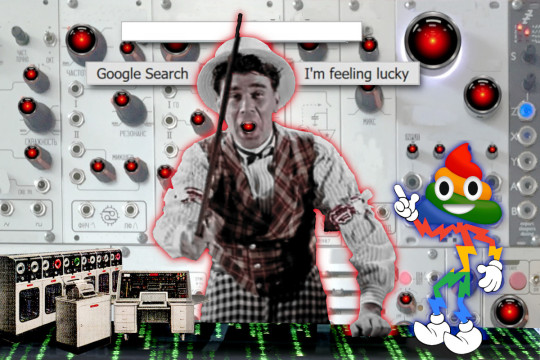
TONIGHT (May 15), I'm in NORTH HOLLYWOOD for a screening of STEPHANIE KELTON'S FINDING THE MONEY; FRIDAY (May 17), I'm at the INTERNET ARCHIVE in SAN FRANCISCO to keynote the 10th anniversary of the AUTHORS ALLIANCE.

The big news in search this week is that Google is continuing its transition to "AI search" – instead of typing in search terms and getting links to websites, you'll ask Google a question and an AI will compose an answer based on things it finds on the web:
https://blog.google/products/search/generative-ai-google-search-may-2024/
Google bills this as "let Google do the googling for you." Rather than searching the web yourself, you'll delegate this task to Google. Hidden in this pitch is a tacit admission that Google is no longer a convenient or reliable way to retrieve information, drowning as it is in AI-generated spam, poorly labeled ads, and SEO garbage:
https://pluralistic.net/2024/05/03/keyword-swarming/#site-reputation-abuse
Googling used to be easy: type in a query, get back a screen of highly relevant results. Today, clicking the top links will take you to sites that paid for placement at the top of the screen (rather than the sites that best match your query). Clicking further down will get you scams, AI slop, or bulk-produced SEO nonsense.
AI-powered search promises to fix this, not by making Google search results better, but by having a bot sort through the search results and discard the nonsense that Google will continue to serve up, and summarize the high quality results.
Now, there are plenty of obvious objections to this plan. For starters, why wouldn't Google just make its search results better? Rather than building a LLM for the sole purpose of sorting through the garbage Google is either paid or tricked into serving up, why not just stop serving up garbage? We know that's possible, because other search engines serve really good results by paying for access to Google's back-end and then filtering the results:
https://pluralistic.net/2024/04/04/teach-me-how-to-shruggie/#kagi
Another obvious objection: why would anyone write the web if the only purpose for doing so is to feed a bot that will summarize what you've written without sending anyone to your webpage? Whether you're a commercial publisher hoping to make money from advertising or subscriptions, or – like me – an open access publisher hoping to change people's minds, why would you invite Google to summarize your work without ever showing it to internet users? Nevermind how unfair that is, think about how implausible it is: if this is the way Google will work in the future, why wouldn't every publisher just block Google's crawler?
A third obvious objection: AI is bad. Not morally bad (though maybe morally bad, too!), but technically bad. It "hallucinates" nonsense answers, including dangerous nonsense. It's a supremely confident liar that can get you killed:
https://www.theguardian.com/technology/2023/sep/01/mushroom-pickers-urged-to-avoid-foraging-books-on-amazon-that-appear-to-be-written-by-ai
The promises of AI are grossly oversold, including the promises Google makes, like its claim that its AI had discovered millions of useful new materials. In reality, the number of useful new materials Deepmind had discovered was zero:
https://pluralistic.net/2024/04/23/maximal-plausibility/#reverse-centaurs
This is true of all of AI's most impressive demos. Often, "AI" turns out to be low-waged human workers in a distant call-center pretending to be robots:
https://pluralistic.net/2024/01/31/neural-interface-beta-tester/#tailfins
Sometimes, the AI robot dancing on stage turns out to literally be just a person in a robot suit pretending to be a robot:
https://pluralistic.net/2024/01/29/pay-no-attention/#to-the-little-man-behind-the-curtain
The AI video demos that represent "an existential threat to Hollywood filmmaking" turn out to be so cumbersome as to be practically useless (and vastly inferior to existing production techniques):
https://www.wheresyoured.at/expectations-versus-reality/
But let's take Google at its word. Let's stipulate that:
a) It can't fix search, only add a slop-filtering AI layer on top of it; and
b) The rest of the world will continue to let Google index its pages even if they derive no benefit from doing so; and
c) Google will shortly fix its AI, and all the lies about AI capabilities will be revealed to be premature truths that are finally realized.
AI search is still a bad idea. Because beyond all the obvious reasons that AI search is a terrible idea, there's a subtle – and incurable – defect in this plan: AI search – even excellent AI search – makes it far too easy for Google to cheat us, and Google can't stop cheating us.
Remember: enshittification isn't the result of worse people running tech companies today than in the years when tech services were good and useful. Rather, enshittification is rooted in the collapse of constraints that used to prevent those same people from making their services worse in service to increasing their profit margins:
https://pluralistic.net/2024/03/26/glitchbread/#electronic-shelf-tags
These companies always had the capacity to siphon value away from business customers (like publishers) and end-users (like searchers). That comes with the territory: digital businesses can alter their "business logic" from instant to instant, and for each user, allowing them to change payouts, prices and ranking. I call this "twiddling": turning the knobs on the system's back-end to make sure the house always wins:
https://pluralistic.net/2023/02/19/twiddler/
What changed wasn't the character of the leaders of these businesses, nor their capacity to cheat us. What changed was the consequences for cheating. When the tech companies merged to monopoly, they ceased to fear losing your business to a competitor.
Google's 90% search market share was attained by bribing everyone who operates a service or platform where you might encounter a search box to connect that box to Google. Spending tens of billions of dollars every year to make sure no one ever encounters a non-Google search is a cheaper way to retain your business than making sure Google is the very best search engine:
https://pluralistic.net/2024/02/21/im-feeling-unlucky/#not-up-to-the-task
Competition was once a threat to Google; for years, its mantra was "competition is a click away." Today, competition is all but nonexistent.
Then the surveillance business consolidated into a small number of firms. Two companies dominate the commercial surveillance industry: Google and Meta, and they collude to rig the market:
https://en.wikipedia.org/wiki/Jedi_Blue
That consolidation inevitably leads to regulatory capture: shorn of competitive pressure, the companies that dominate the sector can converge on a single message to policymakers and use their monopoly profits to turn that message into policy:
https://pluralistic.net/2022/06/05/regulatory-capture/
This is why Google doesn't have to worry about privacy laws. They've successfully prevented the passage of a US federal consumer privacy law. The last time the US passed a federal consumer privacy law was in 1988. It's a law that bans video store clerks from telling the newspapers which VHS cassettes you rented:
https://en.wikipedia.org/wiki/Video_Privacy_Protection_Act
In Europe, Google's vast profits lets it fly an Irish flag of convenience, thus taking advantage of Ireland's tolerance for tax evasion and violations of European privacy law:
https://pluralistic.net/2023/05/15/finnegans-snooze/#dirty-old-town
Google doesn't fear competition, it doesn't fear regulation, and it also doesn't fear rival technologies. Google and its fellow Big Tech cartel members have expanded IP law to allow it to prevent third parties from reverse-engineer, hacking, or scraping its services. Google doesn't have to worry about ad-blocking, tracker blocking, or scrapers that filter out Google's lucrative, low-quality results:
https://locusmag.com/2020/09/cory-doctorow-ip/
Google doesn't fear competition, it doesn't fear regulation, it doesn't fear rival technology and it doesn't fear its workers. Google's workforce once enjoyed enormous sway over the company's direction, thanks to their scarcity and market power. But Google has outgrown its dependence on its workers, and lays them off in vast numbers, even as it increases its profits and pisses away tens of billions on stock buybacks:
https://pluralistic.net/2023/11/25/moral-injury/#enshittification
Google is fearless. It doesn't fear losing your business, or being punished by regulators, or being mired in guerrilla warfare with rival engineers. It certainly doesn't fear its workers.
Making search worse is good for Google. Reducing search quality increases the number of queries, and thus ads, that each user must make to find their answers:
https://pluralistic.net/2024/04/24/naming-names/#prabhakar-raghavan
If Google can make things worse for searchers without losing their business, it can make more money for itself. Without the discipline of markets, regulators, tech or workers, it has no impediment to transferring value from searchers and publishers to itself.
Which brings me back to AI search. When Google substitutes its own summaries for links to pages, it creates innumerable opportunities to charge publishers for preferential placement in those summaries.
This is true of any algorithmic feed: while such feeds are important – even vital – for making sense of huge amounts of information, they can also be used to play a high-speed shell-game that makes suckers out of the rest of us:
https://pluralistic.net/2024/05/11/for-you/#the-algorithm-tm
When you trust someone to summarize the truth for you, you become terribly vulnerable to their self-serving lies. In an ideal world, these intermediaries would be "fiduciaries," with a solemn (and legally binding) duty to put your interests ahead of their own:
https://pluralistic.net/2024/05/07/treacherous-computing/#rewilding-the-internet
But Google is clear that its first duty is to its shareholders: not to publishers, not to searchers, not to "partners" or employees.
AI search makes cheating so easy, and Google cheats so much. Indeed, the defects in AI give Google a readymade excuse for any apparent self-dealing: "we didn't tell you a lie because someone paid us to (for example, to recommend a product, or a hotel room, or a political point of view). Sure, they did pay us, but that was just an AI 'hallucination.'"
The existence of well-known AI hallucinations creates a zone of plausible deniability for even more enshittification of Google search. As Madeleine Clare Elish writes, AI serves as a "moral crumple zone":
https://estsjournal.org/index.php/ests/article/view/260
That's why, even if you're willing to believe that Google could make a great AI-based search, we can nevertheless be certain that they won't.

If you'd like an essay-formatted version of this post to read or share, here's a link to it on pluralistic.net, my surveillance-free, ad-free, tracker-free blog:
https://pluralistic.net/2024/05/15/they-trust-me-dumb-fucks/#ai-search

Image: Cryteria (modified) https://commons.wikimedia.org/wiki/File:HAL9000.svg
CC BY 3.0 https://creativecommons.org/licenses/by/3.0/deed.en
--
djhughman https://commons.wikimedia.org/wiki/File:Modular_synthesizer_-_%22Control_Voltage%22_electronic_music_shop_in_Portland_OR_-_School_Photos_PCC_%282015-05-23_12.43.01_by_djhughman%29.jpg
CC BY 2.0 https://creativecommons.org/licenses/by/2.0/deed.en
#pluralistic#twiddling#ai#ai search#enshittification#discipline#google#search#monopolies#moral crumple zones#plausible deniability#algorithmic feeds
1K notes
·
View notes
Note
I wanted to ask a question regarding your "how to become a writer for established IP" post, if that's okay? I'm not much good for anything longer than a short story- should I be looking to get published by a magazine, or would self-publishing be better to show that I can write and finish a short story, or should I figure out how to do long-form?
You've got an interesting situation here. Let me take the possible analysis a step at a time.
First: most of the time, the rule for prepping to sell some specific kind of fiction is a writing version of "Dress for the job you want." Out of the box, as it were, you should be starting to concentrate on learning to do the kind of writing you want to do in the long term. (Not that you might not change streams later, if you liked, but that's not necessarily at issue here.)
The first thing that has to happen is to get your priorities defined.
On one hand, it sounds like you want to do IP work.
On the other hand, it seems like you feel like you currently have difficulties working at longer-than-short-fiction length.
So the first question to answer is, "What kind of writing do you really want to do?" (Because that's inevitably going to affect the quality of what you turn out.)
Then you have to look realistically at your chances of being able to sell to a market that's buying the kind of writing you want to do... assuming that's possible.
I have to say that from what I currently understand about the big-IP market, most of their buying attention is going to be on novels and similar long-form works. The writers who get to do short-form work in big IPs are routinely those who've already distinguished themselves doing long-form work in that IP. (In fact it's possible the editors on such projects won't even be willing to look at pitches from writers who're not already qualified in that regard.)
Writing at short length for magazine markets, even if you get bought, is (on the odds) unlikely to make all that much of a difference to a big-IP editor. Their main question is going to be, "How good will they be at working with pre-established characters, rather than their own OPs?" (Because that was the first question I ran into when I was new at the game, regardless of the success and award nominations that came with my first book. ...In my case, they took the gamble and found out in a hurry that they'd been absolutely right to do so. But that was a long time ago, and in a kinder market than the one we're all in now.)
Self-publishing short work isn't likely to make that much of a difference for you, either. Self-published short fiction isn't just a dime a dozen at the moment: it's sort of a penny a dozen... if that. In your place, I wouldn't waste my time.
So... how to proceed?
If I was in your shoes, here's what I'd do:
I'd start out by changing the one variable in the equation that I have the ability to alter. I'd start learning how to write long form.
After that, once you've got some credential as someone who can write long, and tell a good story at length, you have a chance at attracting a big-IP editor's attention.*
Now, here's the single most important thing to wrap your brain around:
In the ways that matter (plot, structure, characterization), writing longish short-form is almost no different from writing shortish long-form. (...Okay, I'm laughing at myself for having just written that sentence, because it looks ridiculous; but it remains true.)
A novelette (7000-12000 words) is just a short story (1000-10000 words) that kept going. A novella (10000-40000 words) is just a novelette that you didn't force to stop. A novel (70000-100000 words, sometimes longer or a bit shorter depending on genre) is just a novelette that kept right on going and drove off the cliff, shrieking in excitement and waving its arms in the air. (And what's truly bizarre—speaking from experience—is the longer-form you write, the easier it gets. Short stories are remarkably hard to write well because of how concentrated the combination of plot, character and drama has to be. The longer forms leave you way more room to stretch and breathe.)
You can learn to write at greater length gradually, over time, by doing story planning that, each time, contains more plot, more characterization, and more drama. Keep creating gradually-enlarging story containers that hold enough plot, character and drama to hold reader interest at greater and greater lengths.
You can absolutely do this. Gods (or the Goddess) help me, I'm doing it right now. Look at these three: Tales of the Five #1, 20000 words. Tales of the Five #2, 70000 words. Tales of the Five #3 is completing at the moment, and looks like it'll top out at 100000 words and change. Trust me, story wants to get longer. Do this kind of thing often enough, and sometimes you're going to have to hit it with a stick to make it stop. (And if you're lucky, it will.)
I know this prospect looks daunting, from this end of time. Any project this big looks like Everest. But people get up that thing regardless by doing it in short stages, and one step at a time.
So think about this, and see if it's a way you think you can go. And if you do? Let me know how things go.
*NB that you're still probably going to need an agent to help you do this, somewhere down the line. But (a) this is just the beginning of your road: and (b) once you've started writing decent long-form, you have at least a fighting chance at landing an agent. Anyway, one thing at a time.
(And just a reminder for those of you who may find advice like this helpful: I've got a Ko-Fi now.) :)
254 notes
·
View notes
Note
as a kpop politics amateur researcher-yeah thats the interesting thing about hybe (katseyes label) they are so. So into the idea of being the coolest kid in school because of their major success story being Boys That Sing (i refuse to spell that in case it comes up on search) that they end up doing this weird game of neutrality/bragpop that ends up flat a lot.
For my money, I find that the factory-manufactured nature of K-pop is both its blessing and its curse. On the one hand, the visual spectacle of it is incredible in a way that no other cultural mainstream music genre can compete with, from the aesthetics to the sheer inhuman synchronisation from the dancing. Even sedentary shots of soloists in MVs can take on these breathtaking, otherworldly sorts of qualities. A while back I reblogged a side by side comparison gifset of Taeyeon's INVU and Key's Gasoline, and they look like gods of moon and sun. Aespa's got a whole bunch of slick, cyberpunk-type videos, like Drama. The sheer aesthetics. Your eyes want to drink them
But, on the flip side, the music itself is very often on a scale from vapid to completely meaningless. You might get an overall concept, like "I'm so great" or "I love my partner", but the execution is frequently sugary sweet or just plain hollow. That was one of the big criticisms of MEOVV's debut song, in fact - they went with this boastful "I'm so great" through line, but the lyrics had them boasting about how much money and fame and success they have, when they were (1) launching their first ever song and (2) literal children. You're right that Hybe does this a lot, but they aren't the only ones - Blackpink have a line in one of their songs that basically reads "My Lamborghini goes vroom vroom".
And, that's what happens with the 'churn them out of the factory' model. There's no time for artistry when you're making your artists record two albums a year, plus the dance training, plus the touring, plus the extreme diets, plus plus plus. Katseye's Gnarly is actually a great example of all of this. God, it is an empty song. But! Fuck me, it's a spectacle. The choreography is incredible. And, you know, we get treated to them describing Tesla as gnarly lol, though not in the 'clean version', where I note they're carefully avoiding hurting Elon's feelings.
I should say, of course, that a lot of these issues are lessened in groups that write/produce a lot of their own stuff. (G)-idle's Oh My God is an absolute masterpiece and is a song about a wlw awakening, something you frankly do not often get to see in the K-pop world; similarly, they produced Nxde as a critique of the sexual commodification of women AND as a way to make "nude girl idol" into a dead search term that perverts could no longer use to try to creep on young female idols, since you just get their stages and MV in the search results. IU's Love Wins All is a beautiful love song, with an MV that fucking shreds your heart. Similarly, artists who are sort of K-pop adjacent produce some amazing artistic stuff (Bibi, Jackson Wang, etc).
But, it's because they have time to dedicate to the artistry. And, frankly, to give roles to the members that play to their talents and let them actually shine. Companies are obsessed with forcing all members of a group to sing in the same pitch, and that pitch is "high" - regardless of whether or not a low-voiced idol will sound good in that register, or if it's even ruining their voices. They're all forced into a narrow box, so they can produce that same sugar sweet vocal colour, factory-made and ready. I think it's notable that the groups and artists who most often stand out in that arena are the ones that write for themselves - Stray Kids wouldn't be half the group they are if Felix wasn't allowed to let the bass notes roll, ditto (G)-idle with Yuqi's contralto.
Anyway. This got overlong. But you're right - bragpop fallen flat sums up a lot of it!
#asks#this makes me look like I'm way more into k-pop than I actually am lol#i am super picky about which k-pop songs I listen to#but I am with all music really
150 notes
·
View notes
Text
SSR Mozus Trein - Strict Suit Vignette
"Youngsters these days..."

[Sports Field]
Trein: 1, 2, 3, 4… 5, 6, 7, 8…
Vargas: Trein-sensei, you're not counting loud enough! With training that feeble, your muscles won't feel your passion!
Trein: Don't be absurd, there would be no difference in my muscle strength simply by raising my voice.
Trein: Furthermore, I have no need to build muscle, anyway. I am simply hoping to loosen my stiff body.
Vargas: Yeah, but the other day, I heard you saying to yourself about how you wished you could move as easily as you did when you were younger…
Vargas: So, how is it? Do you like the special "Smile-All-Day-Long Training Regimen" I came up for you?
Vargas: I bet your muscles are squealing with joy!
Trein: Is that what you named this regimen…? Although, I suppose I don't get the feeling that you are attempting to make a fool of me…
Trein: …I suppose I must admit that there have been some positive results.
Trein: At first, I had no confidence that you knew what you were doing… Ahem. Pardon. I must say, I've been feeling much better since starting these exercises.
Trein: Recently, I've been waking up much earlier than before, possibly due to my age.
Trein: Since Lucius is still fast asleep at that time, I could only bring myself to read books, or drink tea in bed…
Trein: Lightly exercising in the morning like this only benefits my body, and is a pleasant change. I thank you.
Vargas: Hahahah, I'm sure, I'm sure. You see, muscles really solve everything.
Trein: Everything? That seems to be a rather large overestimation.
Vargas: Is it, though? I mean, there's no point in just staying locked up indoors, is there?
Vargas: You should just toss your books and do more important things…
Vargas: …Ah.
Trein: Hmm. So, you're telling me that Ashton Vargas-sensei believes that books are useless?
Trein: Have you never learned anything from a book? Then I suppose you have an overwhelmingly brilliant mind.
Trein: If you truly are that wise and knowledgeable about everything…
Trein: I suppose I must have you teach me how to be a proper professor, as well as these exercises.
Vargas: Oh, really? I'll do my best.
Trein: I SAID "IF"!
Trein: My word… Now, I concede that in order live a long life, working on your physical health is just as important.
Trein: One requires strong legs to carry themselves far and wide in order to personally observe the knowledge this world has to offer.
Trein: However, the most vital object to a mage is knowledge. Knowledge is what allows our magic to grow even further!
Trein: You think books are nonsense? Youngsters these days… It would behoove you not to disrespect those who came before you.
Trein: It's because of instructors like you with that sort of mentality that we are falling behind Royal Sword Academy in terms of testing.
Trein: That academy is much more thorough than ours. Naturally, they are not only learning about recent developments.
Trein: At Royal Sword Academy, there is a course where the professor selects literature and reads it with the class, and has the students give their opinions on the piece…
Trein: The resulting discussions are fervent, and even I was astounded by the quality of their final reports at the end of the semester.
Trein: It is absurd to even consider getting rid of books. Our academy should follow in their footsteps.
Vargas: Wow, you sure know a lot about the way another school does things. …Oh, right!
Vargas: I think I heard about how when you were younger, you were hoping to work at Royal Sword Academy.
Trein: What? …Who told you that?
Vargas: The Headmage. I heard you've also applied multiple times even after being hired here.
Vargas: "Even though he has a perfectly good school here… How could he!?" he let slip once.
Trein: That man truly does not know how to keep his mouth shut…
Trein: Ahem. Well, I cannot deny that there was a time I had those thoughts.
Trein: With their shimmering white castle with a long history, it is an academic institution at its height.
Trein: That is why I believed that the Royal Sword Academy was exactly where I deserved to be…
Vargas: Aren't you giving them a little too much praise, there? C'mon, just one look at my muscles is enough to send those stuck-up guys scrambling!
Trein: Stop trying to solve everything with your muscles. As I keep telling you, that isn't the answer.
Trein: Well, anyway… All that is in the past. Now, I am thankful that I did not go to work for them.
Trein: …Since I wouldn't have the chance to see that school lose if I hadn't chosen to go to another academy.
Trein: One day, under my tutelage, Night Raven College will utterly defeat Royal Sword Academy soundly.
Trein: And I will see them regret their choice to not hire a professor as talented as I.
Vargas: Looks like Trein-sensei's the type to really hold grudges…

[Classroom]
Heartslabyul Student: Zzz… Zzz…
Lucius: Mrrrooowww~
[SLASH!]
Heartslabyul Student: GYAAAAAH!!!
Trein: What is all that noise!?
Heartslabyul Student: Ouch… Lucius scratched my cheek!!
Trein: What of it? I'm sure you were simply nodding off.
Lucius: Mrooow~
[Trein picks up Lucius]
Trein: That's right, good. That was a fitting punishment for the rude boy.
Trein: You should thank Lucius for waking you up. Now, we'll continue the lesson.

After class
Heartslabyul Student: I'M SO PISSED OFF~~~!
Heartslabyul Student: Yeah, sure, I fell asleep, but he didn't need to scratch me! It's not my fault that that old man's lesson's just too boring!
Octavinelle Student: So, my dad used go to Night Raven College too, right…
Octavinelle Student: He says that Trein's classes hasn't changed a bit. Said sometimes they'd even get the same worksheets as before.
Scarabia Student: No wonder it's so boring. The class is so old, it's basically fossilized!
Scarabia Student: From what I hear, Lucius was always watching the students like that during Trein's classes, too…
Scarabia Student: Looks like he really likes seein' us gettin' scolded by him.
Heartslabyul Student: The pair of them just piss me off… Think there's any time those two have ever been nice to a student?

Grim: HEY, TREIN!
Trein: What is it, do you have a question for me?
Grim: Nyahaha! I think you got something you wanna say to me, don'tcha?
Trein: Something to say to you, Grim? …I'm afraid nothing comes to mind. What are you talking about?
So, basically…
Grim: IT'S THIS! THE TEST WE JUST GOT HANDED BACK!! Grim: My score went up 10 points from last time! Ain't I amazin'? Grim: You better heap tons of praise on my genius awesomeness!
2. Yeah, I don't get it either.
Grim: What, you don't know either, [Yuu]? Look at this! The test we just got handed back!! Grim: My score went up 10 points from last time! Ain't I amazin'? Grim: The two of you better heap tons of praise on my genius awesomeness!
Trein: Sigh… Is that the only reason why you called out to me? You are still nowhere near average.
Trein: What does it say when you are unable to answer a single question on this section of fundamentals?
Trein: It seems you lack the foundation necessary. If the foundation is shaky, then no matter how much you try to learn, there will be no progress.
Trein: The crucial aspect of education is compounding new knowledge onto prior knowledge. You should always focus and strive to do your best.
Lucius: Mrooowr~~~ Ffft
Grim: M-Myaaah. He's started lecturin' again.
Grim: Tch. C'mon, you coulda at least said one nice thing…
Trein: …However, your ability to solve this problem here was spectacular. We only briefly reviewed this topic in the notes.
Trein: If you were capable of producing the correct answer, you must have thoroughly read your textbook. That is a commendable effort.
Grim: !!
Grim: Nyahahah… Yay! Yahoo~ I gotta tell those jerks who're always pickin' on me that Trein said I did good!
Grim: See that, hench-human? Ain't I awesome?
1. Amazing! 2. You're a genius!
Grim: Right? Hehe, I guessed right. Lucky me!
Trein: What…?
Grim: Oops.
Trein: You guessed? You mean to tell me you picked an answer at random, and this result was merely due to luck?
Grim: N-N-N-No way. I just misspoke!
Trein: Well then, I should give you a similar problem. Since you were capable of answering the previous problem, this should be a non-issue.
Grim: But I can't do that!
Trein: So it was a random guess after all. I had hoped that it had been the fruits of your efforts… Disgraceful!
Grim: But, c'mon~
Trein: NO TALKING BACK!
Trein: I cannot stand such laziness whatsoever. And you sought to win my praise in this manner?
Trein: This is unacceptable. You must receive your just punishment. Now, what shall it be…?
Trein: First, you shall review this test from corner to corner. Understand?
Trein: You will write out each question and answer in your notebook until you've thoroughly committed it to memory. All of it.
Trein: Finally, in order to see if you've truly absorbed the material, you will take a new test specifically on this subject, and must pass it with full marks.
Grim: A test!? But I just did one!
Trein: YOU'LL DO ANOTHER ONE!
Grim: MYAAAAAH!
1. You reap what you sow… 2. You just had to say something…
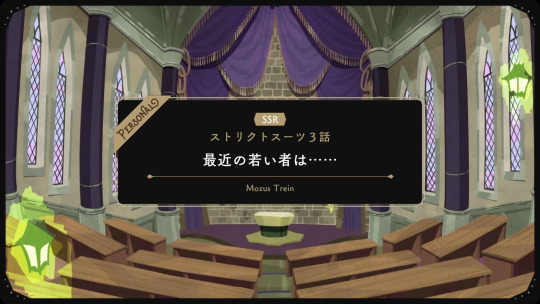
[Lecture Hall]
Trein: Well, it seems it's time to head back to the residence. Lucius, get ready to leave.
Lucius: Mrooow~
Trein: Ah, right. If I recall, we were almost out of milk. I should purchase some on the way home.
Trein: What else… We still have some vegetables, but I should purchase some meat… Hm? My phone is ringing.
[answers phone]
Trein: What is it, Dolly? It's not often you call me at such a time.
Trein: Hm? On your next break? …I see, I see! That is splendid.
Trein: Anna mentioned that she will also be able to come home. It will be nice to have the whole family together for once.
Lucius: MROW!?
Trein: Could you hear that? Yes, it seems Lucius is also excited to see you two.
Trein: How long will you be able to stay? …Hm, I see. You'll be able to enjoy your time a little, then.
Trein: Come home safe. Make sure to behave yourself so as to not cause any issues with those around you as you travel… …I am not nagging.
Trein: …I understand, yes, yes. You've grown into a fine adult. I'll abstain from "nagging" you. That is what you prefer, yes?
Trein: …Yes, your papa is also looking forward to seeing you. Talk to you later.
[click]
Trein: …Did you hear that, Lucius? Dolly and Anna will come home for their next vacation.
Lucius: Rrowwr~~~
Trein: Haha, don't sulk.
Trein: Yes, it is a tad worrisome that they live so carefree like children even as adults...
Trein: However, they lost their mother during their formative years, so they've been through such hardship.
Trein: They may have matured and left the family home, however providing them a solace to return to is still a parent's duty to their children.
Trein: …I'm sure she would have wanted that as well.
Lucius: Rrooowr~~~~~
Trein: Indeed. You were just as attached to her when you were a kitten, I remember. I know just how heartbroken you were as well.
Trein: That is why during this upcoming break, the two of us must welcome them home with open arms, for her sake as well.
Trein: First, the fireplace requires cleaning. Ah, yes, this is also an opportunity to replace the rug. And…
Lucius: Rrowr~~~
Trein: …No, you need not do anything, Lucius. Whatever would we do if you were to break a nail while attempting to put away all your cat toys.
Trein: No need to sweat. All you should do is rest on your little couch and enjoy yourself.
Lucius: Rrowwr~~~~~
Trein: Yes, I know. Since we are sharing in such grand news, I shall open up your favorite can, as a treat.
[rustle]
Grim: THAT AIN'T FAIR!
Trein: Hm!? That surprised me… [Yuu], and Grim. What are you doing here?
1. We were just heading home. 2. We just happened to pass by.
Grim: We were workin' on that stuff you gave us, and look how long it's takin'! And we're not even done…
Grim: But who cares about that… I just heard what you said.
Grim: You keep yappin' 'bout how I gotta work haaaaard, or learn more stuuuuuff or whatever…
Grim: But you're sayin' Lucius doesn't gotta do anything, that's totally different from what you said earlier! That ain't fair!
Grim: So, I wanna do what he does. Hey, Lucius, swap places with me!
Lucius: MROWR!?
Grim: MEEEEOOOW!
Grim: Humph. If I do this, then I won't have do deal with all your naggin', and I can just lay around and get pets and tasty treats, right?
Grim: This is the life! Myahaha!
Trein: No! Do not climb on the desk and try to replace Lucius. Stop it!
1. You sure you're good with just being a cat?
Trein: It's just as [Yuu] says. Lucius is my precious familiar. On the other hand, Grim, you are a student! Trein: Do you not think you are simply causing more of a headache to [Yuu], who supports you day in and day out?
2. I mean, it is a pretty neat gig.
Trein: Wha… Even you say so, [Yuu]? I do hope you aren't planning on jumping on the desk as well.
Trein: As students given the honor to become Night Raven College students, you dare wish to merely relax and do nothing…?
Trein: How wretched. Students thrive because they are thrown into the strenuous trials of academia.
Trein: While you are under my tutelage, I will not allow such disgraceful behavior to continue.
Trein: Both of you must never forget that you are students at this esteemed academy!
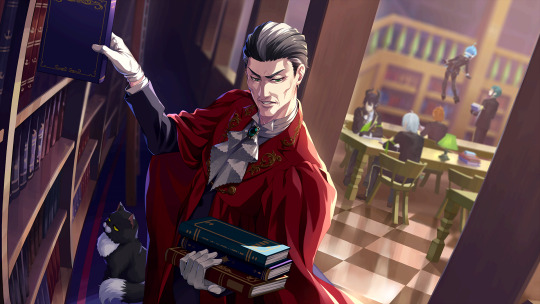
Requested by Anonymous.
#twisted wonderland#twst#mozus trein#ashton vargas#grim#lucius#twst trein#twst vargas#twst grim#twst translation#mention: crowley#.#dolly may be dory only time will tell
367 notes
·
View notes
Text
What is a "daroga"?
In the late 19th century, Persian orthography was not yet standardized, and there was no standard romanization from the Persian alphabet to languages that use roman characters like French or English. When Leroux wrote Phantom, he would have had to make up his own romanization of the word داروغه based on the sounds in the word or use one from an existing dictionary.
This means that when you google the term “daroga” today, it’s often difficult to find more information about it, and often what does come up is about India or Mongolia. The word did come from Mongolian, but it was also very much used in the Persian empire. Today, there are different ways of spelling the word that better reflect the pronunciation in Persian. On top of this, romanizations often differ depending on which language you are using the word in, as different languages pronounce vowels differently.

An example from a Persian-French dictionary from the late 1800s romanizing and translating “daroga” into French. In English, the romanizations “darugha” and “darougheh” are a bit more common today when referencing "daroga" in the context of Persia or Iran. These romanizations help keep the vowel sound for و as “oo” rather than “oh” which is closer to its proper pronunciation.
IPA: [d̪ɒːɾuːˈɣe]
They functioned as more than just the chief of police. Depending on the city and time period, their roles varied. They were in charge of managing the bazaar (central market), catching thieves and punishing them, making sure that the vendors didn’t sell illegal goods, in some cases also levying taxes, and serving as a sort of mayoral figure. They also managed guards who would keep watch over palaces and the bazaar at night.
By the time the Qajar era came around (1789-1925), the role of “daroga” was greatly diminished. They had reputations for being corrupt and collecting money for their own benefits, and a lot of their duties were distributed among other officials. At the end of the 19th century, they were pretty much obsolete, as the shah sought to modernize, and eventually created a more westernized police force to replace the old system.
You can find more information in the following places:
Fiveable - a short list of basic facts
Encyclopaedia Iranica - in depth exploration of the organization of Persian cities throughout history (this site is a high quality resource for finding information on the history of Persia in English)
Sheriff`s position in Qajar era (1796-1896) - academic article discussing the role of the "daroga" in the Qajar era specifically (article in Persian only)
#phantom of the opera#the phantom of the opera#gaston leroux#the persian#daroga#persian history#translation#romanization#language history#persian#farsi
146 notes
·
View notes
Text



flag id: two flags in the same format. each is made up of half-circles coming from the top left and top right edges. there are 5 half-circles coming from the left and 4 from the right; the second circle on the left and first on the right are the same color, and so on, making it so that where the last two circles of each overlap, they become one rounded triangular shape. the leftmost circle is light yellow-green, the second left and first right circles are green, the third left and second right circles are medium dark cool purple, the fourth left and third right circles (forming a triangle) are very dark purple, and the fifth left and fourth right circles (forming a triangle) are near-black.
the left flag has the tunevillain symbol in the center, which is an outline of an erlenmeyer flask half-filled with a sloshing liquid, with bubbles leading up to its opening and liquid erupting from its opening. the flask is silver and the sloshing liquid, bubbles, and erupting liquid alternate between green and light yellow-green. the whole symbol is tilted 30 degrees to the left and is outlined and filled in with pale silver. end id.
banner id: a 1600x200 teal banner with the words ‘please read my dni before interacting. those on my / dni may still use my terms, so do not recoin them.’ in large white text in the center. the text takes up two lines, split at the slash. end id.
tunevillain: a neogender umbrella for terms related to cartoonish/silly villainy
[pt: tunevillain: a neogender umbrella for terms related to cartoonish/silly villainy. end pt]
concepts potentially included under tunevillain:
cartoon vilains, villains from childrens' media, silly/funny villains, etc.
nonsensical evil plans, rube goldberg-esque traps, etc.
silly and evil creations, such as potions/serums with odd effects, machines that do ridiculous things, inept robots, etc.
showiness and flamboyancy related to one's villainy, such as villain songs, flashy outfits, elaborate villain lairs, etc.
failing at one's evil plans, having one's evil creations backfire on oneself, etc.
absurd backstories/reasons for hating the good guys
eccentricity, evil laughter, goofiness, short-temperedness, pettiness, etc.
having a heroic nemesis
and anything else related to cartoon villains, silly villains, etc.!
derived terms:
lein, leinen: a tunevillain person (derived from 'vilein', old french ancestor of 'villain')
rupt, rupts: an older tunevillain person (derived from 'corrupt', in the moral sense)
mal, malae: a younger tunevillain person (derived from 'mal-' a prefix meaning 'evil')
evilanie: a tunevillain gender ('evil' + old french 'vilanie')
tuvilin: tunevillain-in-nature
tuvilline: having tunevillain qualities (equivalent of masculine/feminine). noun form is tuvillainy
evillaic: tunevillain gender alignment
transtuvilline, transtuvil: transitioning towards tuvillainy
the term combines 'tune', representing villain songs/musical motifs and pronounced the same as '(car)toon', 'evil', and 'villain'.
the flag was originally based on a cape that overlaps in the front (like this), but i liked the sort of off-kilter look that making the overlapping stripes the same color gave it. i suppose now it more represents a villain lair?
the symbol combines erlenmeyer flask (2) and the lava from volcano (1) from this folder, plus some bubbles i added myself, to make an exploding potion. here it is by itself:



[image id: two images of the tunevillain symbol, which is an outline of an erlenmeyer flask half-filled with a sloshing liquid, with bubbles leading up to its opening and liquid erupting from its opening. the flask is silver and the sloshing liquid, bubbles, and erupting liquid alternate between green and light yellow-green. the whole symbol is tilted 30 degrees to the left. the symbol on the left is outlined and filled in with pale silver, while the right is not. a blank image is placed between the two to make them take up less space on screen. end id.]
and here's the template for those who want to coin evilanies!
tags: @radiomogai, @liom-archive, @macchiane, @genderstarbucks, @en8y
tags cont: @p-rtyboy, @dragonpride17
dni link
#tunevillain#neogender umbrella#lein#rupt#mal#evilanie#tuvilin#tuvilingender#tuvilline#tuvillainy#evillaic#transtuvilline#transtuvil#my flags#my terms#new flag#new term#mogai flag#mogai term#mogai#long post
69 notes
·
View notes
Note
What are some indie TTRPGs you'd recommend?
It sort of depends on what you mean by indie TTRPG! I'm just gunna throw out some names here, and unpack them in groups.
First of all if you think of an indie TTRPG as something cheap on itch, probably made by a small team of like 1-5 people and are willing to accept all the roughness that can come with that, my first thoughts are Arkball, Pine Shallows, and Tidebreaker. These are all really solid games, with either intentionally limited scope or a lack of greater support. Like, Tidebreaker is a game which includes building the world of the game with it — that's great, but it means that it's a game system that's asking you to do a lot of work, which many of the more established games take off your hands. Arkball is fantastic at conveying its vibe but it is asking the players to make a Sci Fi Sports Story and it might not click if you don't know those genres. Same with Pine Shallows and its excellent Gravity Falls/Hilda vibes.
I don't think most people would consider Blades in the Dark an indie TTRPG, for example. It had a really successful kickstarter, lots of people know it, and while it's still being sold on an itch website, it's still established enough you probably can find it at an actual bookstore, right? But still, it's definitely a game I'd recommend. Similarly, while I haven't played them, I'm really excited to try out Girl by Moonlight and Brinkwood, Blood of Tyrants in the same space.
There are some other indie games that I recommend people check out to learn lessons from them, specifically in the context of 'hey, there are good ideas here, maybe this could benefit from a revision or two.' Like Sleepaway is a game that feels like it's 80% towards perfect at what it's doing, and it has a beautifully excellent kind of structural prop (the conspiracy board). Picking up the PIeces is a really well thought out, excellently considered sort of two person narrative, but also it's about navigating a breakup, and the novelty of what it's doing runs headlong into whether or not I think doing that is interesting to do a second time.
In terms of polish, like, for pure quality of product at a price, Ironsworn is untouchably good. I don't want what it's offering, since it seems to be a story in contest with D&D, a sort of 'look, here's how I'd do D&D right' and I don't need that, because I like what D&D does.
Finally, I guess my favourite indie TTRPG is Dungeons & Dragons 4th edition.
64 notes
·
View notes
Note
So I am someone who hasnt been on Tumblr very much since C2 ended. I followed a group of story analyzers who were more or less very fond of C2, and of the critiques they had; most were minor or “matter of opinion differences”. This changed a lot with C3, where many of that same group have issues relating to the themes, character and worldbuilding of C3 in terms of Divinity, Empathy, Power Dynamics, “The Status Quo”, and Responsibility. Where the conclusions the story draws clash with a previous understanding of the world and its themes in a way that appears incoherent to many of these Analyzers.
Personally I found most of these analyzers to be very intelligent, so when most all of them view the bells hells and their actions, as them being a selfish and destructive, even possibly evil, force on the world. But the cast and matt frame it as “they are the heroes” how is there such a disconnect that doesn’t lead to “wow if only matt and the cast were smarter” type conclusions.
Matt and crew nailed a lot of C1/C2, and these same analyzers praised both campaigns, so why is this campaign, the one where so many fans here and the cast view the world, characters and the themes so tremendously radically different? What possible reasons exist to explain these divergences? And are these things that could rear their head again in C4?
(I kept this non-anon to show good-faith)
I can only speak for myself, and I suspect a desire to avoid a barrage of anon hate and accusations of arrogance is why no one has said this in so many words but as someone who doesn’t give a fuck if people think I’m arrogant, because I am and it’s justified, actually yeah I do think the cast should have been smarter, or at least more thoughtful, in this specific work. In discussing this with mutuals who are also meta writers, one of them pointed out that the structural critique is, ultimately, us saying to the cast "you should have been smarter about crafting this aspect of the plot/themes/narrative." It’s not phrased as such, but it’s the obvious implication.
As for what’s different: it is a campaign that has a much more narrowly focused plot, which required a stronger DM hand on the reins than in Campaign 1 and 2 (and did not have that). It is much more centered around one specific PC leading the entire time, which is different than Campaign 1 and 2, which had more balance and I think led to bolder decisions. It’s that Campaign 1 was crafted around the characters the cast made, and campaign 2 was a dialogue between characters made for the intended plot and setting and said plot, and campaign 3 had a vast disconnect that was never addressed due to poor planning in the earliest stages. And as for the lack of consequences, I honestly cannot tell, but I think it’s that it’s a combination of the characters being so reluctant to make choices that you sort of had to shuffle them forward without consequence in order to actually make any plot happen; and that was the big wrap up of a trilogy and Matt is, to put it tactfully, a rather more sentimental person than I am and his desire to grant everyone a happy ending won over a desire to tell a good story. I really do understand that actual play as story involves a unique and difficult dimension of people feeling very attached to their PCs, but if a DM and players are dedicated to a happy ending that fails to feel earned by the narrative, that will be a detriment to the quality of that narrative. And if you are someone who analyzes, it will fail to hold up to analysis and feel very empty and unsatisfying. This serves as perhaps an alternate interpretation for those who find it hard to stomach the statement of "the cast should have been smarter," namely "the cast should have been more willing to make risky choices and kill their darlings."
As for a Campaign 4: a narrative with similar problems could very well emerge. I think the general informal consensus among meta writers is that it feels like Matt is (understandably, but again, to the detriment of storytelling) overly precious at this point with Exandria, at least with the “modern” era and the C1-C3 characters, but a fresh start far in the future or in a new setting feels like it would mitigate the problem. But yeah it’s 100% possible this could be a problem in the future. I’m hoping this was just a “it’s our tenth anniversary and the last longform campaign of my imagined trilogy, let’s give everyone a happy ending” problem that won’t carry over to future works, but it could be a turn towards general self-indulgent fluff. Wouldn’t be the first time someone started out strong and ultimately became a coward who sanded off all the edges, for various reasons. But because of the strength of, frankly, everything but campaign 3 CR has put out, including concurrent works, my attitude is that I’m still here for a hypothetical campaign 4. It is however undeniably true that the vast stores of goodwill I had at the end of C2 are much smaller now, having been drawn on extensively to carry me through C3, and I’ll be less patient with any potential flaws in a hypothetical C4, particularly if they follow a similar pattern.
I guess to end this: if you are someone who follows me or other meta writers or people you consider smart, first off thanks, second off you are allowed to enjoy a story that I think is not very good. I think defending this story as structurally and thematically sound is a bad idea and I have yet to see a coherent argument in that vein, but there is no counterargument, no matter how intelligent or insightful the writer, to someone else’s “well I liked it.” You can like and dislike what you want, and that’s the end of it, and honestly my issue with so many of Campaign 3’s loudest advocates is that they demonstrated a bizarre incapacity to understand the difference between media analysis and personal opinion, and took all criticism of something they loved as personal attack whether or not it was. Speaking only for myself, if you look at my meta and your response is “well I had a good time,” I respect that (and most of us even agree, even if the good time was had more in the analysis than the watching). But if your response is to say “no, you’re wrong, this is narratively well-crafted,” well then you best come correct.
139 notes
·
View notes
Text
[From a 2014 article by John Darnielle of the Mountain Goats. He's talking about how a random spam email ended up inspiring a part of his book Wolf in White Van. Later, in 2020, the album Getting Into Knives came out, and I think it inspired its artwork too.]
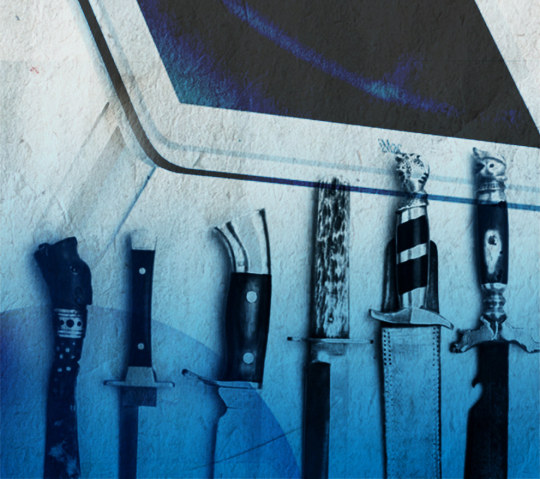
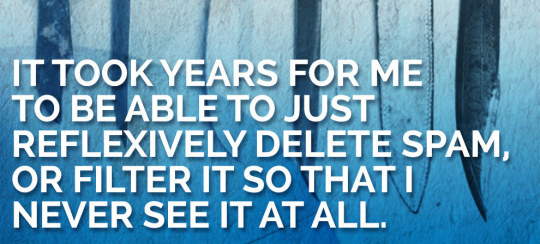
"It took years for me to be able to just reflexively delete spam, or filter it so that I never see it at all. I blame the spammers for this; the quality of their work took a sharp nosedive at some point. But during whatever period of the internet’s growth you’d call the early 2000s, it seemed like you’d still get some winners: things that had been typed up by a person, sent out to a bunch of email addresses they’d bought or rented for 5 or 10 bucks from the only guy who was ever going to make any money in this particular exchange. Most of them went directly, if manually, into the trash; but once in a while, there’d be one that seemed to earn, at the very least, the minute it’d take me to read it.
The one I’m remembering here was subject-lined SUPPLY OF KNIVES. [...] The subject line opened on an all-caps email that boasted, in ornate, antiquated English appealing to the reader’s more refined sensibilities, about the high quality of the knives on offer at an external website. You shouldn’t click on links in spam email. I live my life on the razor’s edge! I clicked the link.
I want to tell you about these knives: They were beautiful. They were weird. They had elaborate designs in the handles, moons or stars of wolf heads, and special grips, and a variety of points. They were made from metals whose pedigrees were described lovingly, and had been struck — smithed? wrought? — via processes I knew absolutely nothing about, but that sounded fantastic, difficult, arcane. It’s the joy of specialized language: When you’re an outsider to it, it can’t help but sound cool.
Of course this is the whole idea of any operation like this. SUPPLY OF KNIVES could well have been, and probably was, a company in Ohio who’d stumbled across an old warehouse full of knives, and knew enough about sales to describe these things in the most exotic terms they could find. I’m pretty immune to pitches: Who likes to feel like he’s being pitched? But somebody involved with SUPPLY OF KNIVES had had just enough authorial flair — that, or true faith — to caption each knife’s mysterious, blurry accompanying JPEG with a description whose constant recourse to specialized vocabularies seemed to say, “You’re not even reading this unless you already know about this sort of thing. Let us therefore speak like the fellow travelers we are.”
It was like a trade catalog for roadside bandits in need of knives.

I can’t speak for everybody, but I know that when I was a child the life of the roadside bandit seemed like a pretty romantic way to go. I looked at all these knives and read the descriptions and was just generally delighted about the whole thing, so I saved the email in a “memorable spam” folder I used to keep that had maybe two other emails in it. A few years later, Apple came out with this robotic-arm-screen iMac you never see any more, and we were long overdue for a new computer so we got that; and then, after a while, I got myself a laptop, because I was traveling all the time, and eventually both the old iMacs ended up in the basement, and they were both asleep but alive until fairly recently, as far as I knew.
But when I went to check for the email, it was gone. The old blue iMac is dead, bricked, lifeless. Searches on the term “supply of knives” on this laptop and on good old robot-arm-screen find nothing. The backup CD for the blue iMac drive is probably in a drawer around here somewhere, but that’s like saying, “The coin I had in my swim trunks’ pocket is probably somewhere in the ocean.” There is no SUPPLY OF KNIVES. There’s only the memory."
[source]
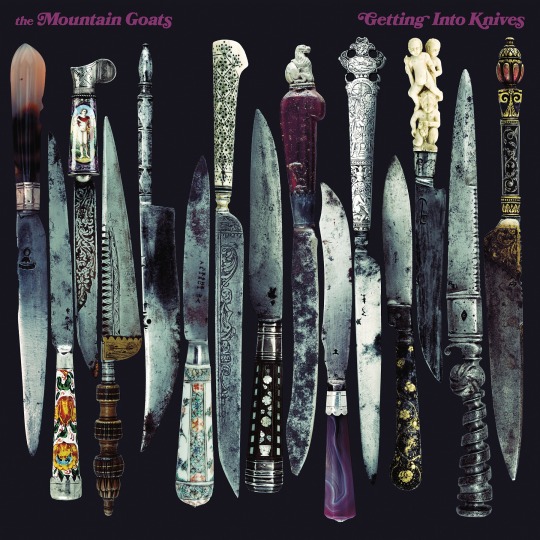
And this is the wonderful cover art of Getting Into Knives. Back cover and promo material below. Note that "Knives International" and "Knives Wordwide" are not real companies, they appear to be a callback to that elusive spam email.


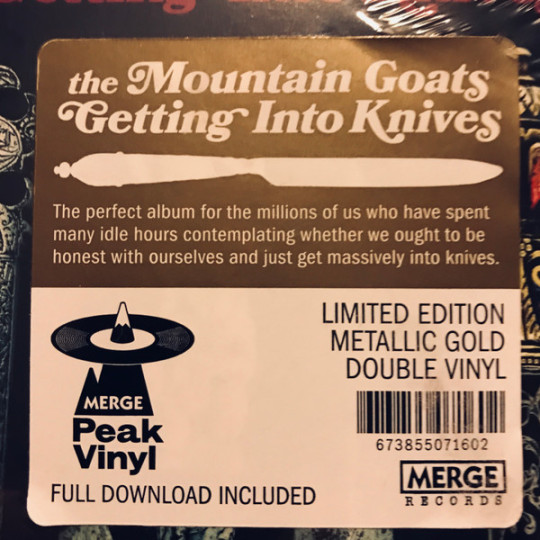
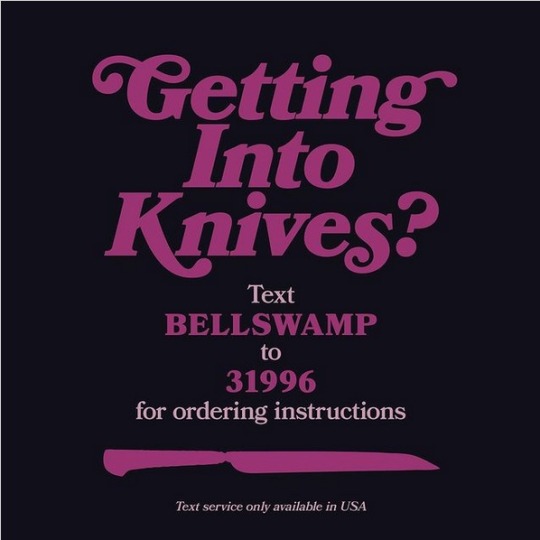
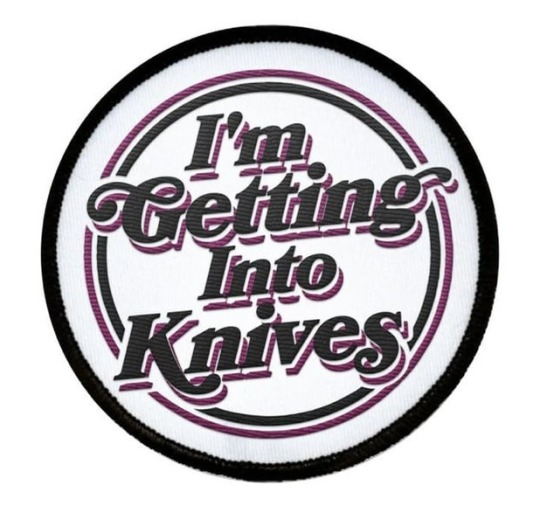
#not that I'm particularly into TMG#but it's interesting#trs#The Mountain Goats#John Darnielle#Getting Into Knives#Wolf in White Van#only knives left#tools of the trade#bandit#prison ballads#tangentially
245 notes
·
View notes
Note
may i offer this thought for the feral racers hc
racecars are like loyal little guard dogs (not little at all. those are metal beasts) with the people they love. they just kinda like. imprint on people and its like an immediate switch to feral mode when they perceive threat and danger to loved one. and they do that thing where they try and make themselves bigger to intimidate enemies.
idk if its something similar like this has posted about or discussed before but uh yeah. the feral racers hc just kinda read to me as racecars being like dogs. wolves. instinctually wild animals. i like how strip and doc being particularly old veterans translates into them being Extra Dangerous or Extra Feral, something like that. though i dont even think racecars get normaller the newer/younger. i think the next gens are just a different flavor of freak (i.e. chewing, zoomies) like they're domesticated sort of in a way
YES YES exactly
ok many thoughts. lets see here
so ive been thinking about this and. the thing is. that part of what makes this headcanon so fun is that theres actually canon precedent, in a way.
Lightning for example. is crazy protective. like instantaneously. zero forethought, action only, putting himself between the Danger and the Friend.
some examples:
in cars TVG, Chick hires the DRH to rob Mack so Lightning will be without supplies for the upcoming race. when Lightning hears that Mack was very upset about it from Sheriff, he gets so pissed off he takes to the streets, tracks the DRH down, and proceeds to spend all night chasing and beating the shit out of them until they drop his stuff. not because he was Robbed, but because they Upset Mack.




i think its funny that Sheriff doesnt say Anything. he just nods in agreement. ...not that i think Sheriff could have stopped him though. Lightning is sort of Insane about Mack. Mack is the greatest. [two quality versions. one oldschool for nostalgia and one more HD]
in the comics (admittedly ive only read in sections), Mater was beefing with Bubba, Lightning also started to get pissed off at Bubba being rude + protective of Mater:

i dont know if Lightning would be good at fighting or get his ass beat terribly. either way, i want to watch.
next up is my favorite example: the thunder hollow crazy 8 race. Lightning LEAPS in to help Cruz several times. it is my fucking Favorite.

HERDS HER BACK OUT ONTO THE TRACK

and then he jumps in front of a speeding attack-bus and takes a metal sawblade to the drivewheel for her. NO thoughts, head empty, protect Cruz. love this man. apparently, type-c school busses can be between 10-20,000 pounds. crunch.

and my last example on this topic: the radiator springs 500 1/2:

these racers show up in town looking for trouble. its supposed to be a silly little western parody, but in terms of this headcanon it comes off as territorial as hell imo. wdym other racecars show up at his house to fight him. hello. and then they insult Stanley, which deeply upsets Lizzie:

cue getting their asses kicked by mcqueen. that is HIS freaky old woman.

[i love this short]
so yeah. my terrible guard-dog-horse-thing-car.
Doc is largely The Same:

14 billion KEEP OUT signs. shooing Lightning away from his friends family because he is A Perceived Danger. another racecar standing in his lawn barking. yeah. you territorial old wet rag.
I agree with what you said its very in line with the vibes of the headcanon yes. true and real. def like dogs/wolves, and i personally try to throw some cat/horse stuff in there too. again, i blame being an x-men/wolverine fan.
a few other tidbits from source material for funsies:




^that ones wallpaper, apparently. for like a Room. in a house. my cars wallpaper merch thats 2018 xrs drag racing diecast merchandise.

Doc was so amped to do racecar stuff again he wakes Lightning up in the middle of the fucking night to run around in circles with him the moment he shows back up in town.


they lost Guido in the fucking sand.

Cars Origins: Struck By Lightning quick aside: "everyone's going to think something is wrong with me" Lightning these are not mentally stable thoughts im so sorry.
second topic: generational/evolutionary differences.
first of all i would like to point out that my basis for strip especially being some sort of craazzy toothy freak is entirely the headcanon of @youhavehitawall that i adopted out of coolness. non has some lore about the weathers that explains it, but basically it boils down to a repeated expression of racecar genes getting more pronounced the more generations it travels down (so long as its an expressed gene).
now for the nextgens (funny calling them that in 2025. theyre all in their 30's lmfao. not saying thats 'old', but they arent rookies anymore, damn does time fly). [disclaimer: dont quote me on this, my knowledge is an approximation] in real life NASCAR, they used very old technologies right up until about 2012. carburetors, leaded gasoline, 4-gear h-box frontend transaxles, reticulating ball steering, etc. most of these things vanished from the dealership road cars between the 60's and the 90's. Meanwhile cars like Lightning and Cal are still running this stuff in the mid-aughts. so when the nextgens came along, they showed up with fuel injection, e85 15% ethanol fuel, 5-speed sequential rear-mounted transaxels, rack-and-pinion steering, bigger aluminum wheels, bigger calipers, and less ground clearance/more areo, there was a very sudden and massive shift in what sort of technology was being run in the piston cup. tech-wise, Lightning +co were very similar to cars like Chick and even Strip. the change in tech could be a good marker for other genetic shifts too. cars change much, muuuch faster generation-to-generation than mammals. its Moore's Law in a way: theyre machines. add that to the incredible 12-week turnaround in which every team booted their driver and replaced them with a 'nextgen', and ive had to spend some time wondering Why? why??? thats brutal! Doc certainly warned us, but goddamn. imagine if that happened mid-season in any real sport! holy shit! (i still want to know more about the fan's reactions to this...) in the context of this headcanon, i Also wonder about what you said, the nextgens being feral in a little bit of a 'different' way. maybe theyve got easier-to-handle temperaments; an added bonus to their overall higher speeds+better track times. uhm. Jackson being the temperament-outlier here, maybe.


to be fair, he did get fired after throwing too many fits.

Cars Origins: Storm Chasing
But yes... racecars!! they are a lottt to handle. the driver AND the incredibly powerful machine mashed into one?? hooo boy. honestly i am a bit fearful of racecars irl. very loud, very fast, smell bad, they breathe fire, etc. why not reconcile that by making the talking ones into Beasts. theyre already crazy, already quadruped, my brain just starts assigning horse/wolf to them. and some of it comes down to me loving logan-wolverine tropes. protective growly little guy with pointy teeth. yeah can i get 5 more of these little fanged bitches.
ok i have to stop yapping now this turned out quite long, but i still have Things to Say about this headcanon/worldbuilding. i didnt even get into the amazing bonds racecars seem to have with their teams/families (the 'imprinting' thing you mentioned!). very fun!!
thanks for the ask!!
69 notes
·
View notes
Text
.₊ ⟡ ݁ 🏆 2024 Top 10 🏆 ⟡ ݁₊ .
hello! I got tagged by a few people for various kinds of tier-list-posts for this year, so instead of making separate posts that will probably end up being repetitive, I decided to combine them all into one Top 10 list of my personal favorites in 2024. My watchlist was not very lengthy this year, partly because I was busy with work and partly because the quality of many shows was not to my liking. I started a bunch of things and dropped them shortly after, which also included more widely popular ones, for which I did not share the general public opinion. In the course of that, I have become more hesitant to share my thoughts online, as with every mildly critical POV came a number of anonymous people breathing down my neck. Which isn't new for me but by the end of the year I have gotten tired and was debating whether or not I should make this post but then I decided that this is my blog and idgaf about butthurt anons lol. I'm trying to carry this mindset into the new year.
So here is my Top 10 of BL/GLs that I have started and finished this year. A very special shoutout goes to The Heart Killers which owns my ass 100% and I totally would have added it but since we're only on ep6, I feel like it wouldn't be fair to include it in this list - also because I sort of consider it a category of its own lol.

I had no trouble picking this as my number one, simply because it's an outstanding production with an S-tier cast and a very powerful and well executed script. I've always loved Up but Poom took the cake for me in this, I was absolutely starstruck by him and his screen presence, he's a big surprise for me and has become one of my personal favorites this year in terms of acting. I could fill books with reasons why I love this show.
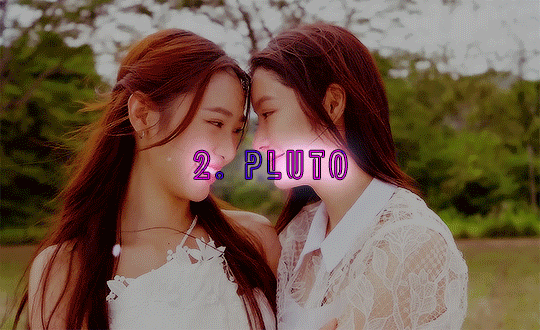
I had to include this even though it's not finished but I'm really blown away by it. The GLs I previously watched were okay but did not strike me quite as much as this one. I knew I would love Film and Namtan together from the moment they got paired as they're both insanely skilled and I was not disappointed. They understand the assignment 100% and so does Snap25 and it really shows. I'm obsessed.

Speaking of masterpieces, this is another one. It didn't get much attention sadly, mostly because TayNew did not deliver the dynamic the general BL population was hoping for. Their loss. This is an amazing production from start to finish, the 4 of them are the best possible casting choice for their characters, the found family trope is one of the best I've seen and especially TayNew delivered another gem with this one. I shall never doubt them again. This is how you do bromance. Certain other shows could never. send tweet.
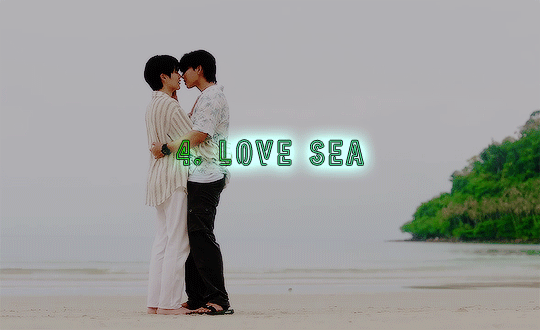
Ah yes. No year goes by without the obligatory Mame guilty pleasure lol. What can I say. FortPeat as annoying southern scuba boy meets snobby whiny writer on a beach. How can I look away. I genuinely enjoyed this, it feels like the story was written for them, it's a perfect fit for them and their range I think plus I'm glad that Aya finally found a GL partner that matches her energy lol. I loved both couples and even though the plot did lack sometimes, you can count on MMY to serve S-tier chemistry no matter what. A+.
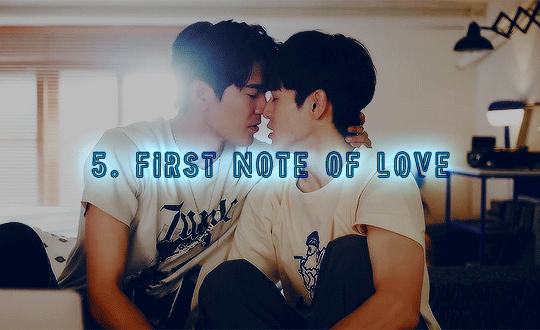
This is my personal hidden little gem, a small production with not a ton of attention, let alone good reviews but sometimes those are the best ones. The beginning was a bit slow but it quickly picked up. I decided to give it a watch mostly because I was curious about Charles' followup bl role and ended up getting very attached lol. So much softness and deep emotions and mutual healing that happened here and that I appreciated a lot. This was also my first Taiwanese BL in I think 3 years(?) I loved it.
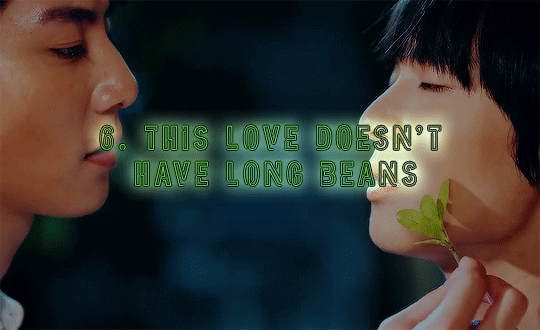
I was very excited to watch this and see what Change 2561 came up with after Pit Babe and even though I'm not the biggest fan of cooking plots, I ended up enjoying this a lot! I've been a SailubPon and GarfieldBenz connoisseur since Pit Babe and it was so nice to see them in the spotlight in this. I saw a bunch of people drop it because they found Plawan annoying but I disagree lol. I had a very good time.
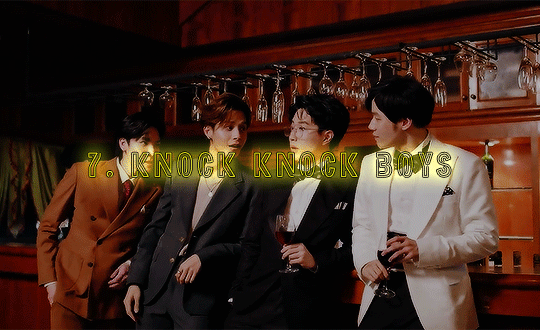
I initially tuned into this for Seng and Best, just to see what they're up to these days and it ended with me eating the whole thing up lol. The unapologetic approach to topics like sex education mixed with the sweet love stories that came with it is one of the things I appreciated + enjoyed a lot. I was a big fan of Peak and Thanwa and would definitely watch another show with Seng and Best as I really love their dynamic. Latte and Almond had a good start but fell a bit flat towards the end. Still a very deserving 7th place for me.
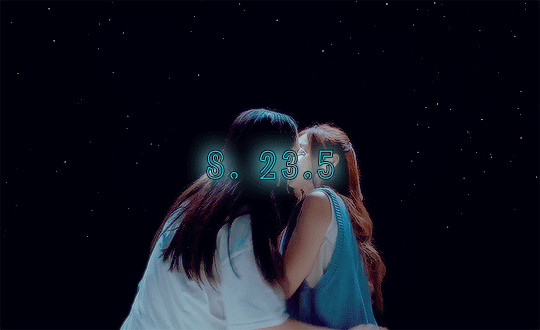
I was sooo excited for this and overall it did not disappoint, though I think it could have been better in some aspects. The comprehensive vibe was juvenile but not in a bad way. I anticipated gmmtv would choose a trope-y plot for their first GL to test the waters and it seems they succeeded. The main reason I put it as number 8 is the AylinLuna side story which I very strongly disliked for multiple reasons I won't get into here. But MilkLove did a fantastic job and this was a very nice debut for them. Thumbs up!
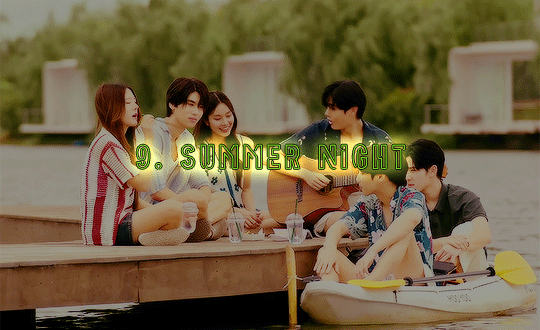
This might be the most unexpected gem for me this year. I started watching it because I was bored and nothing else was on and I was curious to see Dunk in his first solo gig. Surprisingly he did a big leap forward with his acting in this and White was by far my favorite character. Lune on the other hand was my least favorite which was another surprise as I previously loved Phuwin as Peem in We Are so I'm not sure why Lune was so unlikable. But anyway this was a very nice combination of different cute little stories, LuneStar were very trope-y but White saved a great deal of it by being the third wheel lol, plus the BL sideplot was pure sugar. I'm sad we won't see Ryu and Java together again and I resent them not giving us that well deserved WhiteIvy endgame but overall I enjoyed this a lot!
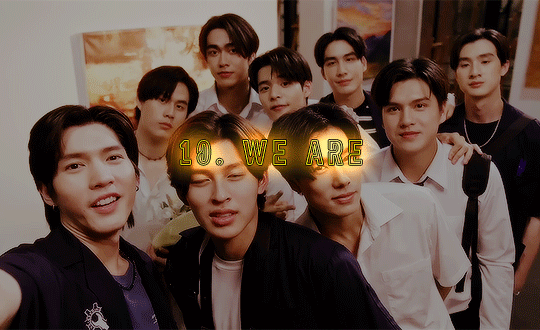
Never thought I would put a Siwaj production in my Top 10 but I'm tired of pretending I didn't secretly love this lmao. So much chaos but so much fun. It's a typical ensemble show, mostly aimed at a domestic audience with lots of slapstick and horseplay comedy, but I ended up being quite fond of all the couples. The main crystallization for me was that this is PondPhuwin's territory, this is the type of show they belong in imo. They excel at this kind of comedy and they seemed very careless and joyful in this, which I enjoyed and which made them a decent main couple. The QToey plot was a bit draggy and even though it's a big cast, 16 episodes were not necessary, which is why it gets the 10th place. But overall it still deserves to be in this list.
Thanks again to everyone who tagged me; in this and other things over the year, I appreciate you thinking of me!! 🥺🧡 I didn't manage to reply to every tag but know that I see them all and I try to do as many as possible! Also a big thank you and much love to all the lovely people I talked to this year, especially @lattexalmond, @mayalunas @bl-recs-and-reviews and @my-wandering-rabbit, I love and cherish each one of you! 🧡 Happy New Year to everyone who read this far, here's to a kind and successful 2025 with groundbreaking shows lol. I'm hopeful.
xxxx
#happy new year#top 10#top 10 list#bl dramas#thai bl#gmmtv#my stand in#pluto the series#peaceful property#love sea the series#first note of love#this love doesn't have long beans#knock knock boys#23.5 the series#summer night the series#we are the series
63 notes
·
View notes
Note
do you have any skinning tips? mistakes you see too many people make or techniques you don’t see people use enough
also you mentioned random noise being bad. does that apply to opacity too? my skin has fuzzy leggings so the opacity is randomized and i like how it looks but if you have a better technique i’d appreciate it
(prompted by your post abt skin streams. “skin streams”… that’s a horrifying term out of context…)
So this is a topic that I& wanted to make a whole post where I& would analyze Joe's skins and give my& insight on how they could be improved, so I&'ll be using his skins as examples in this post!
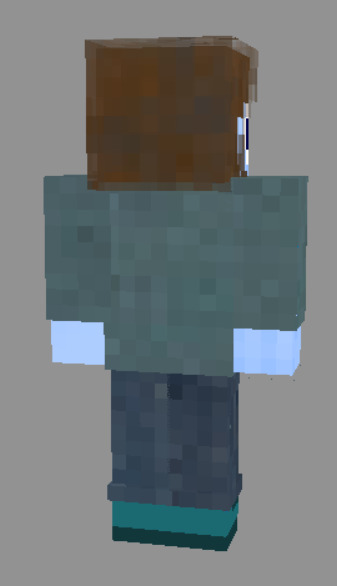
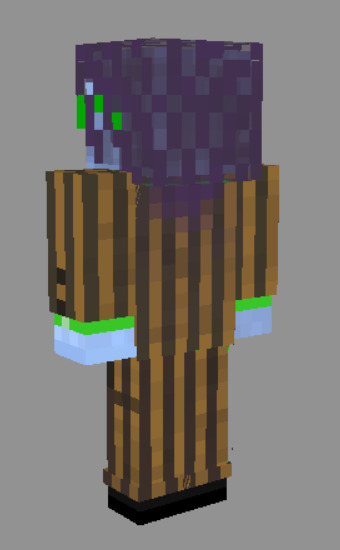
So there are several reasons why most skinners don't use random noise anymore. For one, it makes it slightly more difficult to recolour skins for the future (a thing that I& know for a fact Joe wants to do). For two, Minecraft skins are a form of pixel art, and every single pixel you use matters.
We can turn to Minecraft's wool block to see how the game itself does fuzzy cloth textures:


You can see that instead of doing a random noise pattern, the texture uses a pattern of doubling up the pixels to replicate the way fur and fuzz naturally separates into strands! Now, in a Minecraft skin we would have much less space to do this, but it's still very much a similar technique for things like fur!
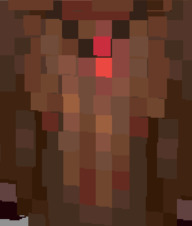
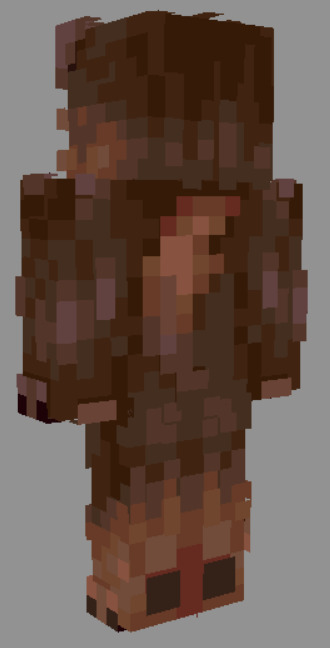
What you see me& doing here is using a similar streaks pattern plus the top layer for additional volume and so that in certain places it creates additional thin shading lines (such as on the arms), a thing Joe cannot do because he opted to use the top layer for the jackets that can be taken off. It might seem like a good idea to do that, but the problem is that the situations in which you take off your top skin layer are very rare (can't even recall a single time he did that tbh), and the downsides of not having an additional layer of volume to work with are not worth it.
Here's another example of how to replicate a different fuzzy texture, one with short fuzz clumps instead of long fur:
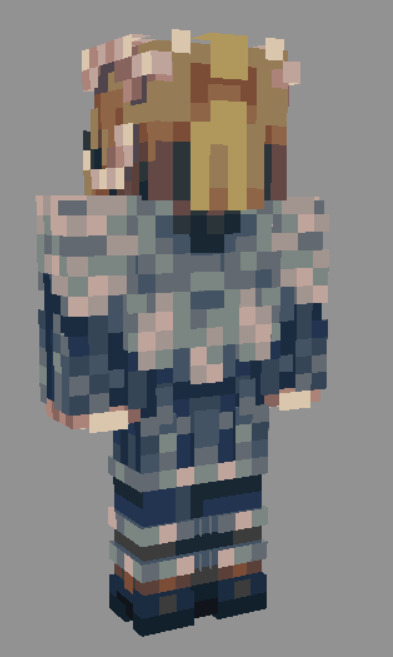

Then there is the question of colour palettes - when you use noise, you lose control over your colour palette. It's common knowledge in art that you should hue shift when shading, but noise is only ever going to shade your texture with black and white. As you can see in the above examples, I& can make the highlights on the texture a desaturated yellow-ish and the shadows a cold blue, or use a reddish transition between the shades of fur just like in real animals.
There is no one universal pattern for how to do a fuzzy cloth texture, but the brain likes a consistent pattern, and it also makes shading much easier to do when you're not using a noise for it!
Now, as for that hair.... It uses this same thing you described where the opacity varies. In theory, there isn't anything.... inherently wrong with that? Hair in real life can sometimes have a bit of a transparent quality? But a reason why this technique isn't used much is because it looks less like hair with anti-aliasing and more like you have a transparent brown plastic bag on your head? A brown cloud? At the scale of Minecraft skins, we register each individual pixel as its own little detail, and the transparent pixels represent transparent objects.

Here's an example where this is completely fine to do - the object is supposed to be a semi-translucent and textured sleeve, so the transparent pixels carry across exactly the meaning intended. You'll also notice that the texture utilizes another common pattern - checkerboard dithering! Dithering of this kind is usually reccomended to be used sparsely, but it's a very simple way to add texture with meaning and intent rather than noise. This sort of texture best fits things such as tights on legs!
So yeah, I& can imagine a really good application of changing opacity for texture, and it's certainly not a crime, but the way Joe is using it specifically doesn't look intentional, it looks like random scribbles on the head. Just do anything other than randomly scribble. Please. It's not even shaded. Can you imagine what a nightmare it would be to shade random scribble noise.
(Now, as for a bonus, I&'ll actually show a skin that breaks all of these rules that I& made a while ago:
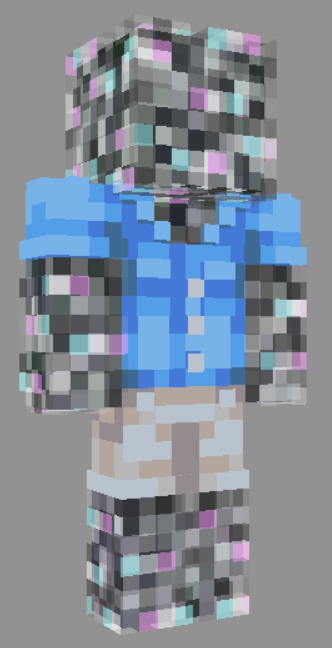
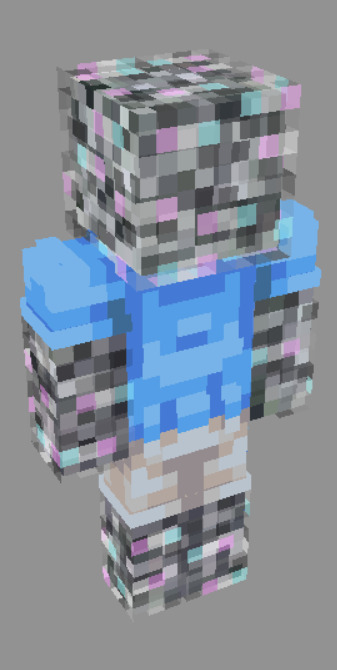
It's a skin that depicts a person with a cloud of TV static for skin. And wanna know a fun fact? Even this skin wasn't made using PMC's noise tool. I& actually did all of the upper layer manually because the glitch effect looks nicer that way. You can see how the horizontal streaks actually make the noise effect look MORE like static than if I& used a completely randomized noise. I& agonized over this, btw.)
31 notes
·
View notes
Text
Also preserved in our archive
By Nicole Karlis
A disease that's prevalent in women highlights the female sex bias in medicine
In modern-day culture, it’s common to complain about being tired. But for some people, being extremely tired is just one symptom of a disease that’s increased in awareness since the COVID-19 pandemic that can severely impact everyday activities: myalgic encephalomyelitis/chronic fatigue syndrome (ME/CFS). Though the condition has existed for a long time, it can often manifest after a COVID infection, especially as an aspect of long COVID, in which symptoms linger for months or even years.
As research has shown, many long COVID patients either have symptoms similar to chronic fatigue syndrome or have been diagnosed with the disease. But just as long COVID remains a complex mystery, so does it’s so-called sister disease, chronic fatigue syndrome. Similarly, it’s a disease that researchers feel hasn’t been taken seriously in the scientific community. Not because it’s new, but because part of its female bias, coupled with its association with extremely debilitating fatigue, which is only one aspect of the condition. Even the term CFS can be misleading.
“The name chronic fatigue syndrome does not reflect people's symptoms as chronic fatigue is not the main feature of this disease, and for anyone to think that it is would diminish people's experiences,” Chris Ponting, a professor at the University of Edinburgh to co-lead of the DecodeME study, which is the largest ME/CFS study in the world, told Salon. “It’s also female dominant, there are five times more people within ME who are female than are male, also more people are more likely to have ME if they're older.”
That means, Ponting elaborated, that the typical ME/CFS patient is an older woman. According to the Centers for Disease Control and Prevention (CDC), having ME/CFS makes both physical and mental exertion difficult. Symptoms can include extreme fatigue, but also trouble thinking, severe tiredness and an inability to do activities, like shower or cook themselves a meal. There is no cure or treatment, and no official diagnosis process.
“Policymakers in this world are more often going to be younger males who have very little risk for this disease, and are perhaps completely unaware of the devastation that it has wrought across our population and still does through its sort of sister disease, long COVID,” Ponting said. “And without that understanding, without perhaps that personal knowledge, it flies under the radar despite affecting one in 200 people.”
One of the most peculiar aspects of chronic fatigue syndrome is its underlying biological mechanisms. In the world of health, people are frequently told that physical exercise is good. It’s an idea that has pervaded all of society around the world and for good reason. Scientific research has found that regular physical exercise reduces the risk of many types of cancer, heart disease, stroke and diabetes. But for ME/CFS patients, exercise is not usually recommended as a remedy — and can actually be harmful.
“We've been told from birth, if you're feeling out of sorts, go out outside and exercise, and we're told even in our last decades that exercise is good for us,” Ponting said. “But it is absolutely not true for this disease. It is actually reducing people's health, quality of life, and reduces their ability to move.”
As to why that’s the case, Ponting said the answer remains to be discovered, as the biological mechanisms of the disease are not entirely known. What is known, Ponting said, is that a majority of people come down with the disease after an infection. This could indicate that it’s the result of a problem with the immune system. There also appears to be a genetic component to the disease. In the DecodeME study, researchers are focused on studying the DNA of people with ME/CFS because they suspect some differences could reflect the biological causes of the disease.
Dr. Charles Shepherd, a medical advisor to the ME Association in the United Kingdom, was diagnosed with ME/CFS after he contracted chickenpox from a patient.
“I had a pretty nasty dose of chicken pox. All the sort of symptoms of chicken pox went away, but I just continued to feel unwell — not just a bit unwell, but quite unwell,” he told Salon. As a doctor, it was puzzling to him. He had debilitating fatigue that was exacerbated by physical and mental activity. Resting, he said, also didn’t help. He also had post-exertional malaise, which is a worsening of symptoms after minimal activity, which is a hallmark symptom of ME/CFS.
“It took me two years to get a diagnosis because I didn't know what was going wrong,” he said. “I wasn't taught about this illness when I was at medical school, and so again, very common still today, and I did all the all the wrong things from the point of view of management.”
Shepherd has been living with the disease for nearly 40 years. Yet he describes himself as one of the “lucky” ones who has found ways to manage his symptoms.
“The output of the prognosis is not good,” Shepherd said. “Probably only around about five to 10 percent of people make a full and sustained total recovery.”
Ponting said the fact that it occurs after an illness could mean that “the battery of the cell the mitochondrion has gone wrong in some way,” Ponting said. “But the shocking thing for me is that we don't know, and that's why we're doing the research.”
Shepherd has been able to find relief through “pacing,” which is energy and activity management. Currently, treatment usually also includes cognitive behavioral therapy to manage peoples’ symptoms. Graded exercise therapy, Ponting said, used to be recommended as part of the UK’s guidance, but isn’t anymore. The therapy included increasing a person’s level of activity, but it proved to be too harmful to people.
Through Ponting’s study, potential breakthroughs could be on the horizon.
“We'll show or shine a light down onto what exactly should be studied next,” Ponting said. “But what we're not going to do, unfortunately, is discover a drug that will help people manage their disease over the next few years.”
#mask up#public health#wear a mask#pandemic#wear a respirator#covid#still coviding#covid 19#coronavirus#sars cov 2#long covid
72 notes
·
View notes